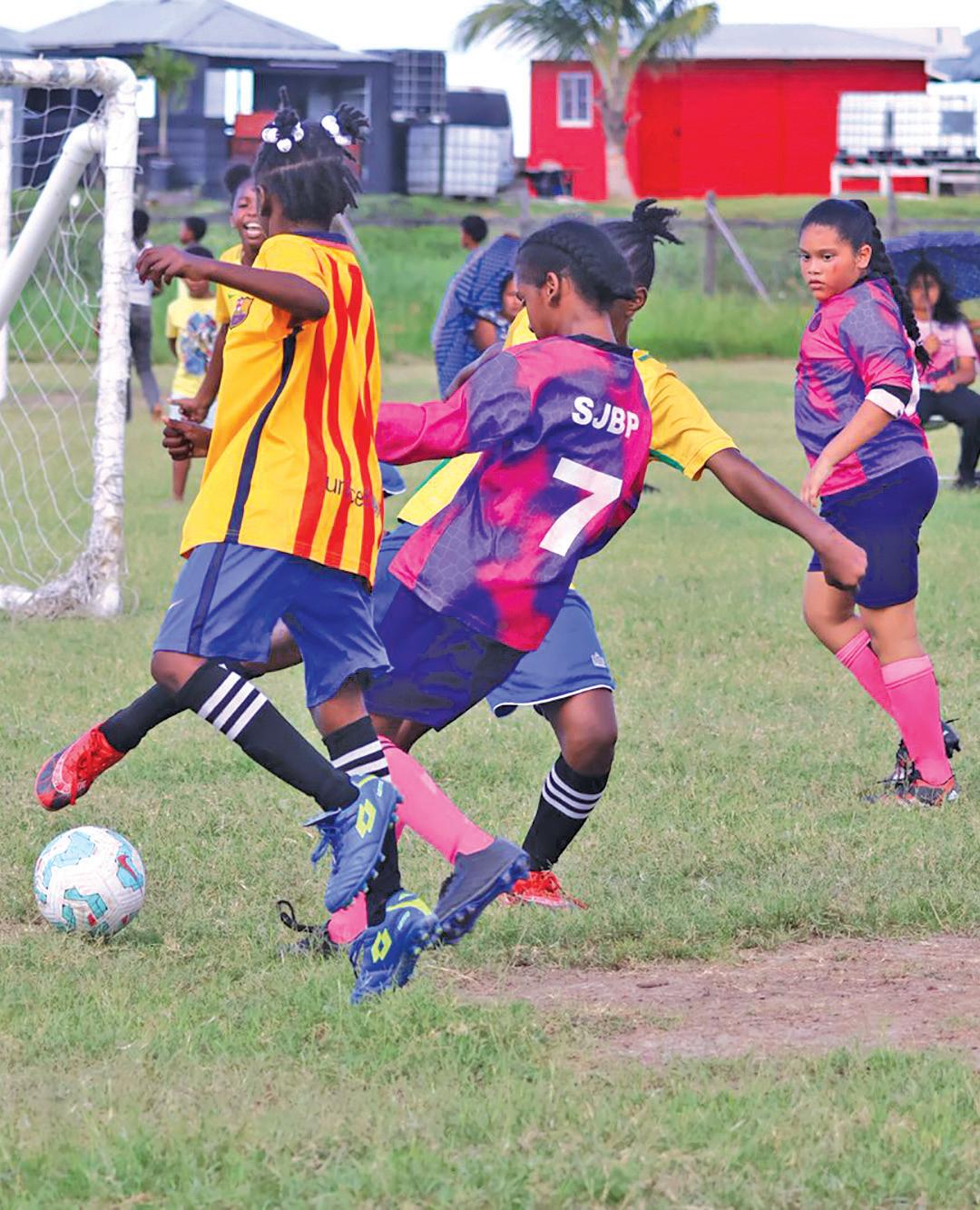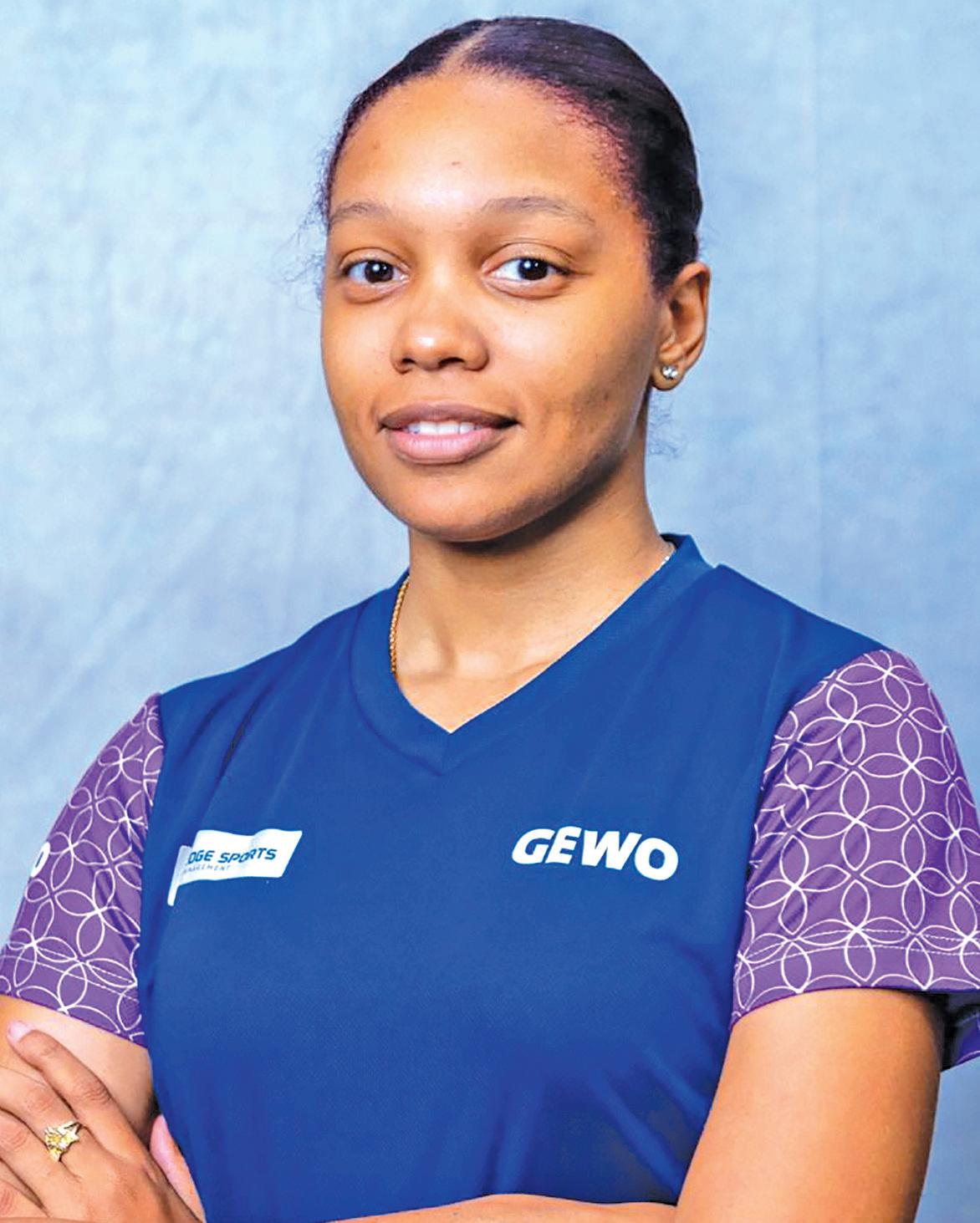
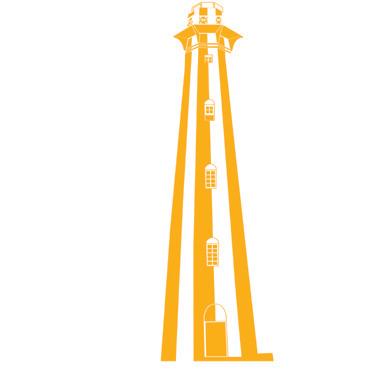
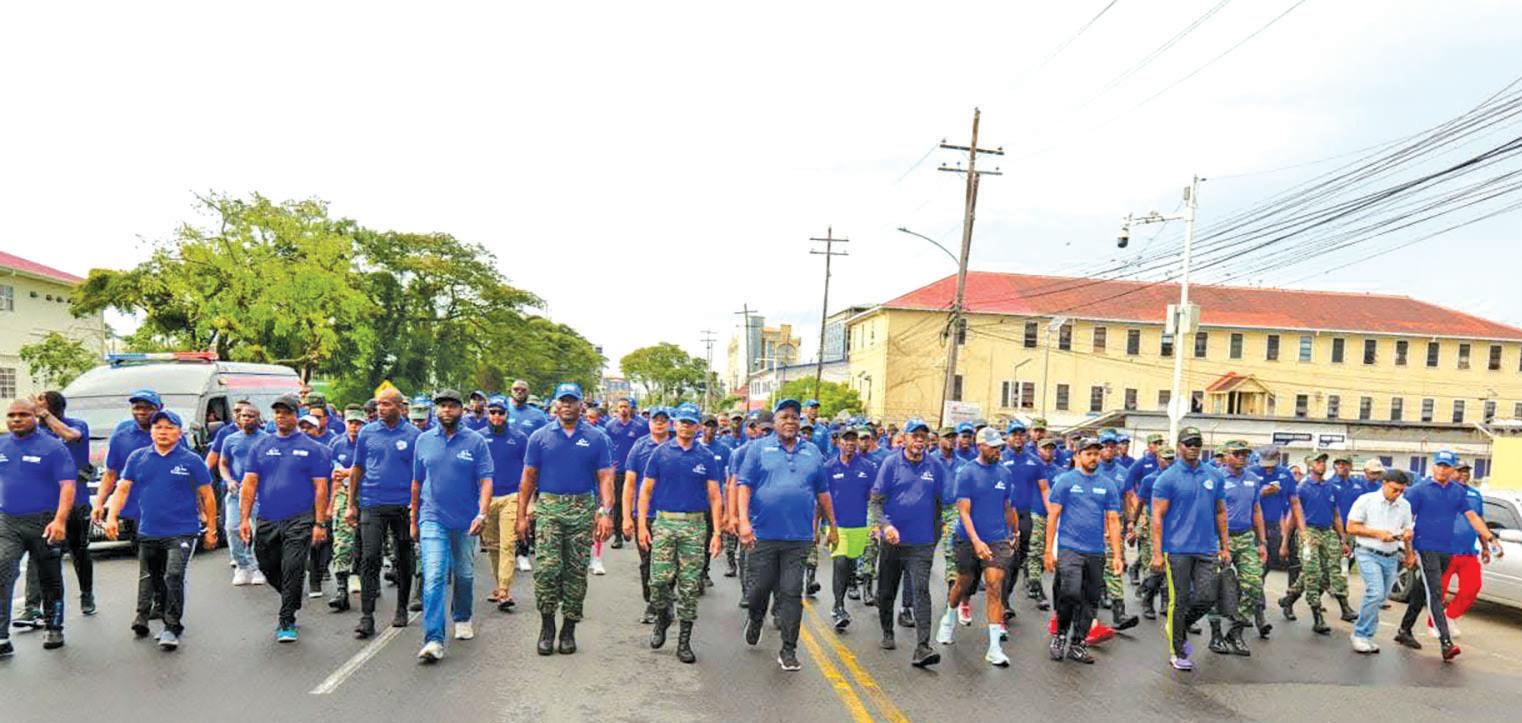






...lauds in-house SoP system, strengthening of cybersecurity
New BK terminal to boost Guyana’s food distribution capabilities in interior & Caricom countries – President Ali says enhanced



US Navy, GDF successfully complete PASSEX in Guyana waters Essequibo labourer busted with ganja during Police operation


US to launch new phase of Venezuela operations, sources say Mother and oneday-old baby die at New Amsterdam Hospital ...as





The Berbice Bridge will be closed to vehicular traffic on: Monday, November 24 –06:15h–07:45h and Tuesday, November 25 – 06:55h–08:25h.


Parika and Supenaam departure times – 05:00h, 10:00h-12:00h, 16:00h, 18:30h daily.




Thundery showers are expected during the day, with partly-cloudy skies at night. Temperatures are expected to range between 23 degrees Celsius and 29 degrees Celsius.
Winds: East North-Easterly to East South-Easterly between 2.23 metres and 4.47 metres.
High Tide: 06:31h and 18:40h reaching maximum heights of 2.35 metres and 2.46 metres.
Low Tide: 12:14h reaching a minimum height of 0.90 metre.










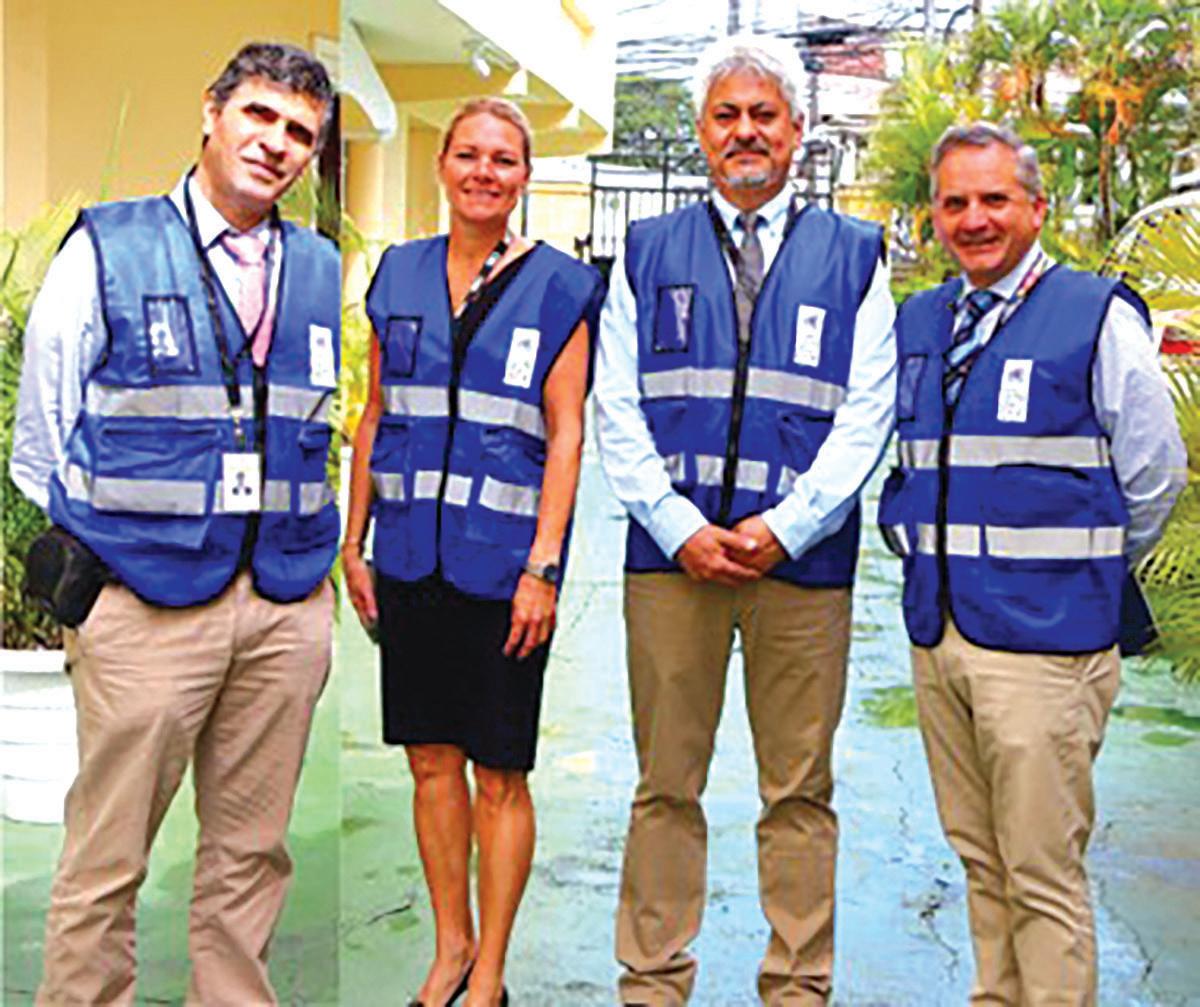
The Guyana Elections Commission (GECOM) has been praised for delivering what the United Nations Development Programme (UNDP) describes as one of the “most transparent, credible, and professionally managed elections” in Guyana’s modern history. The commendation is contained in UNDP’s comprehensive report on the 2025 General and Regional Elections, highlighting major reforms, strengthened communications, improved operations, and innovative IT systems that enhanced public trust and institutional confidence.
According to the report, the September 1, 2025 elections represented not just a civic milestone but a defining moment in rebuilding confidence in Guyana’s electoral process. With technical assistance from UNDP Guyana–funded by the Government of the United Kingdom–GECOM implemented a series of reforms and operational upgrades that observers say contributed significantly to an orderly, peaceful, and widely accepted election.
UNDP: Building trust in democracy
UNDP’s involvement in Guyana is part of its global expertise, having supported elections in more than 60 countries. In Guyana, the agency provided strategic advice, strengthened communications, enhanced logistics, and supported the introduction of innovative technology–efforts that together reinforced GECOM’s role as a trusted guardian of democracy.
The multidisciplinary UNDP Electoral Support Project guided these interventions to ensure they were “practical, timely, and responsive.” As the UNDP Team Lead noted:
“The elections, despite challenges, were calm, peaceful, and professional-
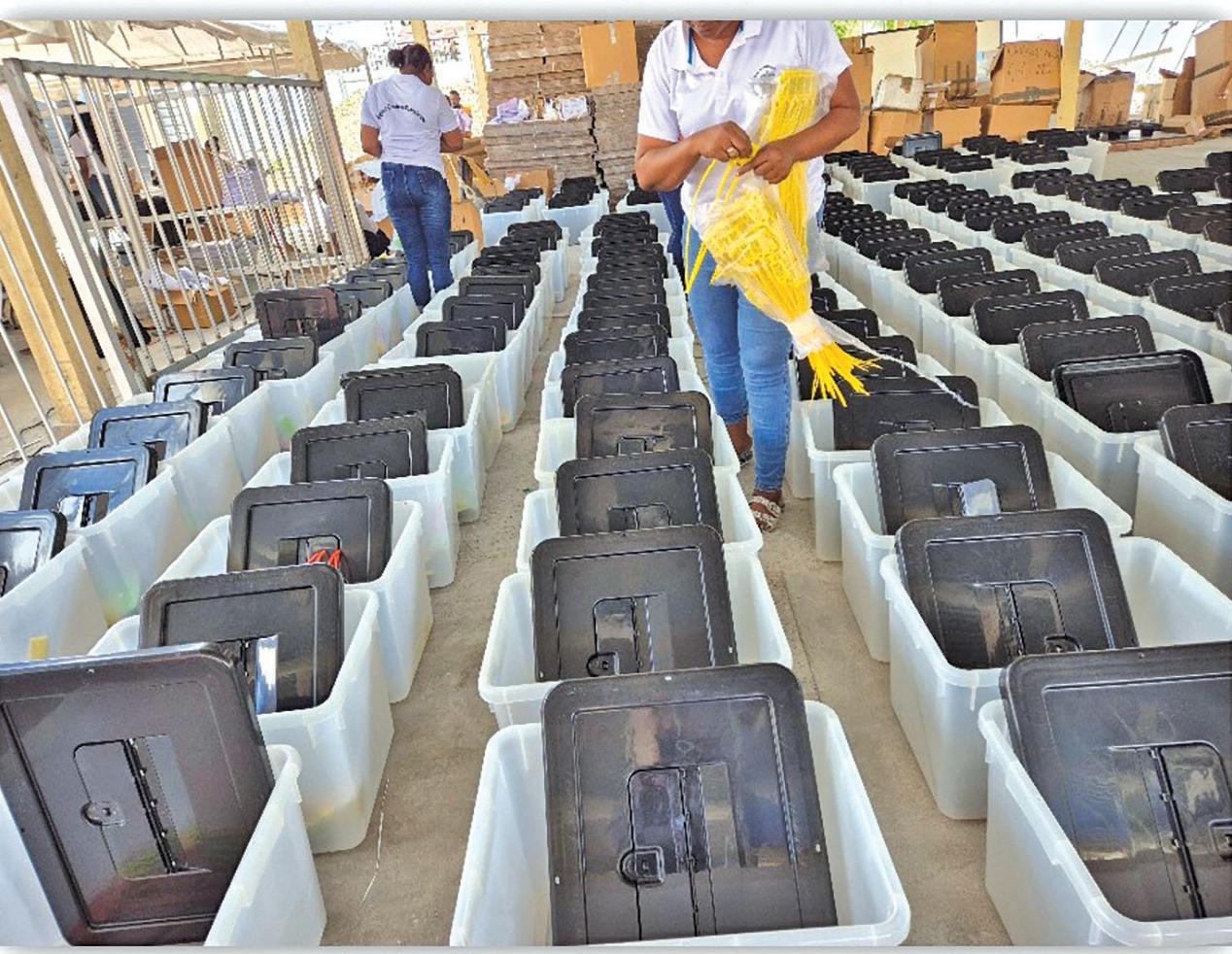
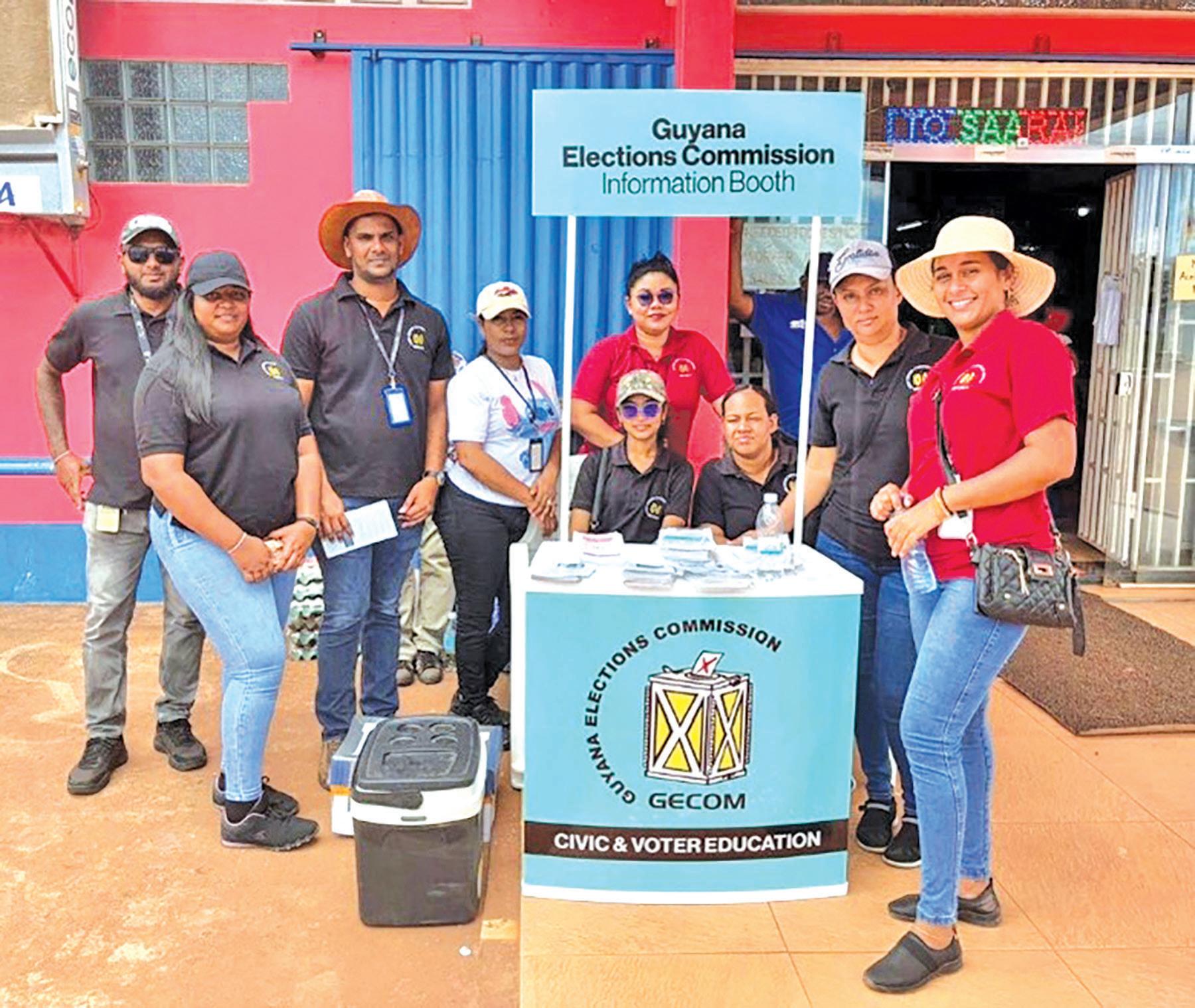
ly-managed. Results were delivered within days, and all political parties accepted the outcome. The professionalism and direction taken by GECOM were central to this achievement.”
Additionally, one of the most transformative areas of support was communications. UNDP assisted GECOM in developing and implementing a Communications Strategy, a Branding Manual, and a Crisis Communication Protocol, which together ensured clearer, timelier, and more consistent public information dissemination. A Media Code of Conduct and Media Policy were also introduced to guide responsible coverage of the electoral process, and more than 100 journalists received training on electoral law, procedures, and ethical reporting to strengthen accuracy and fairness in media coverage.
Civic and voter education campaigns were rolled out across the country, reaching citizens in hinterland communities and dense urban centres alike. These
initiatives were supported by a newly established feedback framework designed to identify and address emerging concerns and misinformation during community outreach. UNDP also worked closely with disability-rights organisations to improve inclusivity, ensuring that pol-
were trained on how to support persons with disabilities and that voter education materials reflected Guyana’s diversity, including youth, women, men, senior citizens, and persons with disabilities.



Editor: Tusika Martin
News Hotline: 231-8063 Editorial: 231-0544, 223-7230, 223-7231, 225-7761
Marketing: 231-8064 Accounts: 225-6707
Mailing address: Queens Atlantic Industrial Estate Industrial Site, Ruimveldt, Georgetown
Email: news@guyanatimesgy.com, marketing@guyanatimesgy.com
President Irfaan Ali and VP Bharrat Jagdeo have announced plans for the Government to launch a Development Bank capitalised to $200 million and designed to encourage the growth of small and medium-sized enterprises (SMEs). The Development Bank is not intended to replace the commercial banks, which the Government is working to modernise but to complement them in facilitating small entrepreneurs who may be unable to secure financing from them. While the full details have not been released, assisted by India which has tremendous success in this area, the Bank is expected to be catered for in the next Budget and be operationalised before the end of next year.
Back in the 70s, the then Government had launched GNCB as a public bank, competing with the several commercial banks then operating, and GAIBANK as a development bank, securing its funds from grants and loans from the international community. By the 80s, the Government effectively assumed control over the entire banking industry through varying levels of nationalisation of the private banks. The experience might be an object lesson for our policymakers in the present iteration.
The rationale offered for the massive Government intervention then, as now, was market failure. GNCB as a public bank was responding to the unmet need for a more distributed and accessible banking system while GAIBANK was intended to fill the endemic financing gap for targeted entrepreneurial activities left unattended by the commercial banks.
Unfortunately, the system quickly degenerated into a classic, rightly-criticised, “repressed” financial system that actually resulted in low investment and thus low growth. This situation was exacerbated by several negative features: cronyism, rentseeking and corruption by bureaucrats, misallocation of funds in misconceived schemes, etc. By the 80s, we had plunged into negative “growth”.
The IMF’s Structural Adjustment Program (SAP) of 1989 bequeathed our present financial system: banks and other financial institutions totally privatised and “liberalised”. It was putatively subject only to market forces with Government reduced to a “non- distorting” regulatory role. GAIBANK was dissolved and GNCB privatised. So, we have three decades’ experience with the liberalised financial system. What have we learnt?
The developed world has now accepted what China and the other “emerged” and emerging economies have shown: participation of Government is vital in the financial sector. Otherwise, the social function of overall national development – which necessitated the invention (and the ongoing maintenance) of the banking system in the first place – will inevitably be eroded and vitiated by the workings of unmediated human greed. A system driven only by the profit motive cannot do otherwise. We have been spared the worst excesses of the financial depravity experienced up north – through our relative “underdevelopment in financial instruments”. On the other hand, the expected banking efficiency or the financial intermediation necessary to foster growth of our economy as noted above is still a work in progress.
Our privatised banks have maintained and even extended the dispersion of branches into the countryside, but these have been deployed to more efficiently trawl for deposits rather than for disbursing more loans. In this former task, they have been singularly successful, but in their reluctance to service the domestic entrepreneurial potential necessary for our development, they have piled up huge “surpluses”. Theoretically, in the financial liberalisation model, the private banks were supposed to have competed with each other to lend the funds secured from deposits leading to the lowest possible rate of interest and still make a profit over the rate offered to attract deposits. If the claim was valid, it certainly never reached Guyana.
In our considered judgement, we threw out the baby with the bathwater when we closed down our development and public banks. The raison d’être for those institutions is even more evident – and necessary – today, if we want to achieve the double-digit growth rates necessary for a quantum leap in living standards. The present Government is attempting to fill this gap in financing.
Of course, we have to rectify the downside risks inherent in government ownership, which in our case, having tried the model, are more easily-identified.


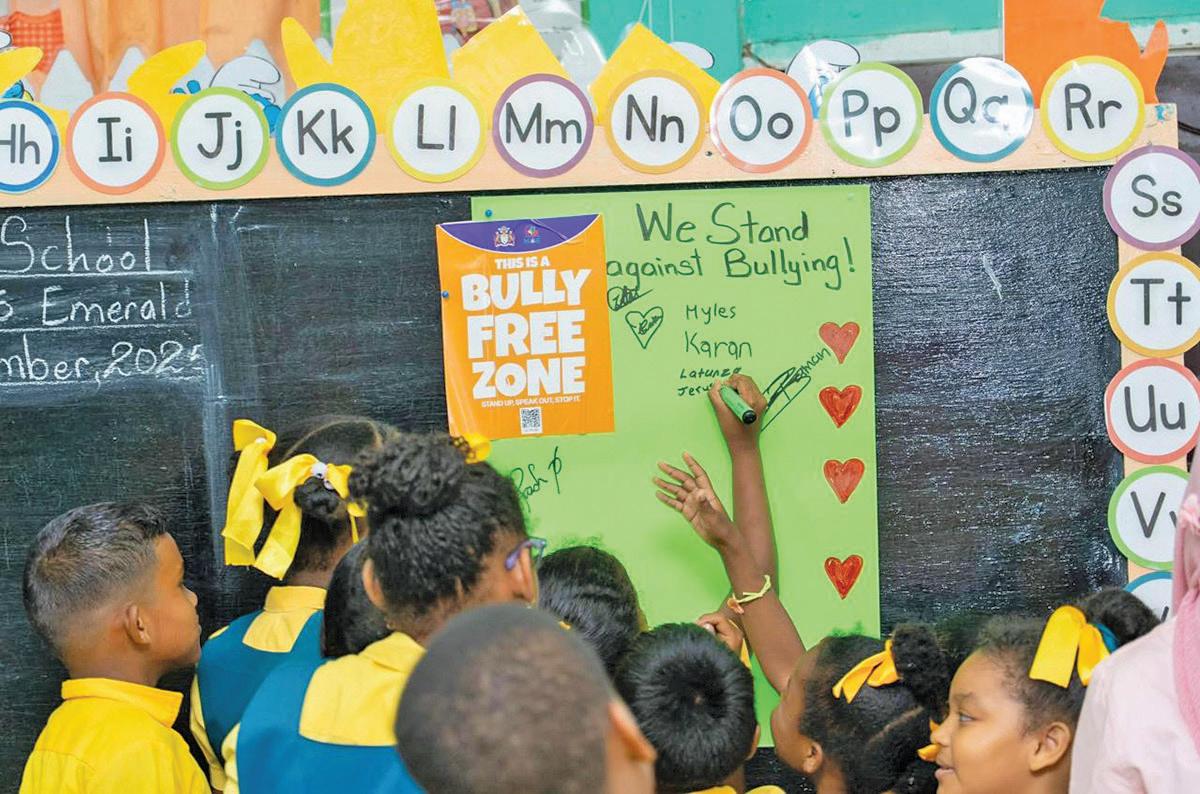

By Dr Amit telAng, mD
HigH Commissioner of inDiA to guyAnA AmBAssADor of inDiA to CAriCom
These days, the moment you swipe your smartphone, you will be bombarded with messages about herbal remedies and dietary supplements. Sometimes the list of avoidable items is so exhaustive that if you follow that list scrupulously, you would certainly lose your self-esteem if not actually your weight. It would eventually dawn upon you that practically everything in your kitchen and in your fridge is a potential health hazard – the root cause of your obesity and a plethora of metabolic diseases.
A step further and you would have a two-flanked army launching a brutal attack upon you – one proffering a list of healthy items and the other brandishing an equally-exhaustive list of unhealthy items. Confusingly enough, many of these items would make a miraculous appearance on both lists, leaving you completely baffled. Amidst the flurry of good morning, good evening and other such absolutely-meaningless posts on WhatsApp, these messages will not only populate your smartphone but leave you a complete wreck in mind, minutes, and money.
The Fitness Epidemic is no amusement, or a ‘cool’ thing. Sermons on crash diets and food fads have become the modern-day Bible and Bhagawadgita. I call it an epidemic because it’s spreading like wildfire and
everyone believes that not joining the bandwagon is the biggest FOMO. Fitness is undoubtedly important, but the Fitness Epidemic is a ticking time-bomb. Imagine the impact on our bodies and brains, on pockets and prestige.
But following the fitness regime without adequate scientific evidence might cause more harm than accruing any long-term benefit.
Since herbal remedies and home remedies constitute an important part of this ‘fitness epidemic’, it is important that the issue is approached systematically, and a fair and frank discussion is initiated. Traditional medicinal systems, by nature, have evolved out of empirical evidence. It took generations to establish the precepts of their practical applications. It is not as simple as a ‘Turmeric shot’ or a ‘Detox Diet’. The concept of a balanced diet has always been at the centre of good and healthy lifestyles. Local produce has been a priority as it is a perfect balance of nature and nurture – experience over generations and due devolution to genetic constitution and environmental factors.
In traditional medicine, tradition obviously plays an important role. But it is also characterised by the basic concept of medicine. From cultivating and harvesting to cooking, food is not merely a source of nutrition, but a medicine in a true sense. Everything in ideal proportion is healthy/nutritious and anything consumed in excess can become a poison. Our forefathers approached
food and nutrition systematically and evolved these basic tenets. Unfortunately, however, they remained confined to specific societies. With the advent of social media, some of this traditional wisdom is being rediscovered and widely circulated. Yet, a word of caution. They need to be tested in different populations and geographical areas, and their impact on people of different genetic pools requires further examination and documentation. A one-sizefits-all solution is neither advisable nor desirable.
We have always cherished our age-old traditions and especially the medicinal systems that have been subsumed under the acronym AYUSH. This traditional wisdom belongs to the entire humanity, and alongside other traditional medicinal systems they comprise our collective heritage. Nevertheless, there is a need of empirical research and documentation. It requires a global effort and collective contribution towards evolving a strategy that would effectively address the need for a scientific approach towards a discipline that has to go beyond the realm of a ‘fitness epidemic’ to globally-accepted protocols on traditional medicine.
The forthcoming second WHO Global Summit on Traditional Medicine, scheduled to be held in India from December 1719, 2025 seeks to stimulate discussion on many such contemporary concerns and invoke interesting deliberations on this topic of glob-
al relevance. We remain engaged with Guyana and many of our Caricom partners on this important topic that would have bearing on our evolving policies and shared pursuit of equitable, accessible, and evidence-based healthcare systems across the world.
Traditional medicine has long been a repository of cultural identity, community wisdom, and humanity's collective knowledge of nature and well-being. The world has renewed its appreciation for integrative health approaches that combine traditional wisdom with modern medical science. The objective of the WHO Global Summit on Traditional Medicine is to strengthen research, enhance quality and safety standards, and ensure that the benefits of traditional medicine are available to all.
The theme of this edition of the Global Summit: “Restoring Balance: The Science and Practice of Health and Wellbeing”, would encourage global dialogue fostering meaningful international cooperation in the field of traditional medicine.
We look forward to welcoming experts from Guyana and all our partner countries from the Caribbean to participate and share their ideas and views and contribute towards the global effort towards creating a balanced, healthy and sustainable world. For further details related to the WHO Global Summit on Traditional Medicine, visit the website: https://tm-summit.org
Dear Editor,
I have lived through enough election cycles to recognise when an argument looks tidy on paper but collapses the moment it touches the ground. The European Union’s final report on the 2025 elections sits in that uncomfortable space. It praises the process, professionalism, reforms, peaceful atmosphere, and competence of polling staff. Then it pivots to the familiar refrain: the “advantage of incumbency,” as if good governance must be treated as a form of misconduct once an election year arrives.
According to the report, the government must slow down to avoid appearing competitive. Officials would have to avoid visiting communities that rely on support, shelve projects already budgeted, and curb routine state work—all because someone might call it an “advantage.” Ribbon-cutting ceremonies? Too risky. Hospitals opening? Off-limits. Subsidies for
farmers? A scandal waiting to happen. The only way to stay “balanced” is to become invisible.
This is not how democracies function. Governments in Europe campaign on results. They launch programs, highlight achievements, cut ribbons, and claim credit for their work. Nobody pauses progress to soothe the opposition. The public judges a government by what it delivers, not by how quietly it retreats before an election. Here, doing the job too well is treated as inherently suspicious.
Ironically, many of the actions the EU labels as “advantages” are standard for any political party. Opposition parties also make house calls, run programs, and actively court votes. The WIN party went as far as buying votes. Only the government is flagged. Meanwhile, numerous media outlets openly support the opposition, amplifying their messages without restraint, while the report barely notices. Treating
routine activity by the incumbent as suspicious is absurd and unfair.
The EU report doesn’t explicitly call for an operational freeze. It recommends clearer rules on state resources and campaign conduct. That is reasonable; transparency benefits every country. Yet the section on incumbency insinuates that doing one’s job properly during an election is suspicious by default. That interpretation risks undermining the very institutions the observers praised.
This is the contradiction sitting at the center of the document. You cannot applaud the reforms of 2022, admire the technical improvements, endorse the training, and validate the smooth administration of the polls, then imply that the governing side should have done less governing to preserve the appearance of balance. A country cannot mature democratically by weakening its own executive functions every five years.
What Guyana must not do is embrace a model where governance becomes handicapped during campaign season. The electorate deserves continuity of development. Schools, roads, hospitals, and social programs are not “incumbency perks.” They are the work of a government fulfilling its mandate. Treating them as advantages confuses diligence with wrongdoing.
Undoubtedly, the EU remains a valued partner. Its observations deserve serious attention. Yet certain recommendations carry hidden implications. If democracy depends on progress, then progress cannot be treated as a liability once the calendar turns toward an election. The country has come too far to entertain that paradox. Good governance is not cheating. It is expected. A thriving democracy is measured by what it delivers, not by how quietly it steps aside.
If doing one’s job during an election is now considered a scandal, then maybe the
President Ali must be commended for his Rescue
Dear Editor, Since becoming President in 2020 and again in 2025, His Excellency, Dr. Irfaan Ali has made it clear to all that he will be the president for all the people of Guyana and not only those who voted for him. Over the years, he has kept his word by visiting several communities across the country and has received a warm welcome and overwhelming support from all. The truth is President Ali is a people’s person who is loved by almost everyone. However, his most recent visit to the Tiger Bay community proved that actions speak louder than words or speeches. As part of the “One Guyana” initiative, President Dr. Ali along with several members of the cabinet and Heads of Departments visited one of the most depressed areas in the country –Tiger Bay – where he outlined a plan for major urban renewal. Located in the Kingston area, Tiger Bay is home to a resilient, spirited and vibrant population, many of whom
have been the foundation of Georgetown civilisation, culture and heritage.
While strolling the streets of Tiger Bay, His Excellency bonded with families, small business owners, elders and youth. He told them that part of his urban renewal plan is to build a basketball facility, especially for the youth, restore the two historic buildings in the area, expand support services for children and mothers, and help property owners upgrade their homes, among other things. President Dr. Ali’s Tiger Bay visit reinforced his hands on and people first approach to good governance aimed at uplifting everyone in every community and provide opportunities for all to improve their living standards.
The president listened keenly to the complaints of the residents and addressed some if not all of their major concerns ranging from access to education, to improving drainage, to skills training, micro- and small-business
support, and ways to engage young people through sports and after-school activities. He cautioned them to be patient because some of their concerns might take time to achieve, but they will be attained. Many community members, including the elderly were encouraged by President Dr. Ali’s visit, his emphasis to be transparent and his promise of follow-up visits to measure progress and to make sure that the residents are satisfied.
President Dr. Irfaan Ali noted that both the solutions derived, and the lessons learned from his visit to Tiger Bay will be a model for similar development efforts across Georgetown and throughout the country. His visit to Tiger Bay ushered in a new chapter for the residents of the community as he invited them to come together and “break bread” as a gesture to celebrate unity and symbolise the spirit of togetherness that marked the occasion. He personally took part in preparing
a meal for them.
As part of his Rescue Georgetown Plan aimed at beautification of the city, President Dr. Ali has invested on a $350 million project that is currently underway to clear overgrown vegetation at the Le Repentir Cemetery, According to His Excellency, the initiative forms part of the government’s national beautification and enhancement drive to renovate, restore, and modernise cemeteries and other areas across the country. The Rescue Georgetown Plan developed by President Dr. Ali is an ambitious under-taking intended to transform the capital city into a beautiful and natural Garden City. It is a good initiative that will create jobs, improve the lives of the people and make communities safer and more secure, It is fully supported by all citizens and President Ali must be commended for it.
Yours sincerely,
Dr Asquith Rose
Dear Editor, Ecuador recently held a referendum on whether to allow an American Military Base to be established in its country to help combat drug trafficking and violent gangs. Although significant economic development would result, voters have chosen to reject the establishment of an American Military Base. A surprising development, especially given that Ecuador has had such a base in the past. This begs the question, why?. The President of Ecuador estimates that 70% of global cocaine flows through the country. (Reference: NPR news, Ecuador rejects U.S. military bases in major defeat for President Noboa, November 17th 2025).
This recent event presents two important considerations for Guyana: Should we embrace having an American Military Base along our Western Border? When will we hold a referendum on renegotiating the oil contract with Exxon?
Given the current pending military conflict with Venezuela over Essequibo and the strong agreed to position with our American ally to prevent drug trafficking and the strengthening of the violent gangs from Venezuela, the answer to allowing an American Military Base should result in an easy "yes" answer in our government. The economic de-
velopment that will also result along our western border will help boost and sustain the growth of our economy. Regime change will eventually come to Venezuela, but their position on Essequibo will most likely remain the same. However, with the presence of the American Military our nation will be assured of improved national security and the prevention of any future dispute over our sovereignty. In addition, the resulting economic development along the border will increase safe and beneficial trade and commerce with the new Venezuelan government.
As for the second consideration, this was a political promise made by the PPP to have a
only safe form of governance is complete inactivity. Maybe everyone, voters included, should curl up in their beds on election day and wait for the ballots to be counted. That way, nobody, not a soul,
can ever be accused of having an advantage.
Yours sincerely, Kwame McCoy, Minister in the Office of the Prime Minister
Dear Editor, President Ali led his cabinet, (PPP) MPs, and advisors on a two outreach in Region 6 on November 20-21. In the press conference that followed the outreach, the president reiterated the commitment of his administration to continue with the rapid development of the region.
From Corriverton to Lochebar (West Canje), residents turned out in their numbers to engage with the presidential entourage. A full gamut of issues was raised, discussed, and in some instances resolved on the spot.
The two-day outreach in Berbice brings to mind observations made decades ago by Göran Hydén, a noted development scholar. In No Shortcut to Progress, Professor Hydén warned that it is impossible to develop economic policies or deliver government services to regions and communities away from the national capital without sustained and direct engagement. Modern governance must go beyond the ‘economies of affection’ that characterise rural areas. This is done by developing information loops between citizens and policymakers. This way, policies are based on reliable data, and first-hand qualitative inputs from those who are ‘on the ground.’
President Ali was insistent
that accountability and transparency are foundational dimensions of his administration. He challenged cabinet members, permanent secretaries, and heads of agencies to connect with Region 6 communities in order that the ‘whole of government’ approach is a lived reality.
The outreach clearly indicated that the priorities of the region is rapidly changing. Instead of mere ‘bread & butter’ issues, residents are keen on getting better and faster government services, connectivity, accessing information of government contracts, improved recreational facilities, more green spaces, and the opportunities associated with the Orange Economy now being put in place by the current PPPC administration. President Ali renewed his commitment to deliver on these concerns and to fulfil the commitments made in the PPP/C 2025 election manifesto.
Indicative of the resolve to move forward, the president called a de-briefing and policy meeting after midnight on day one of the outreach. The meeting lasted well in the early hours of dawn. Only hours later, the entire entourage was back at work.
Yours sincerely, Dr Randy Persaud Office of the President
referendum on the oil contract with Exxon after the elections. The elections have been successfully completed, and the United Nations has for the most part given its stamp of approval. This should be encouraging and make it easier to have a national referendum held on whether to renegotiate the oil contract with Exxon. Ecuador was able to quickly have such a referendum and Guyana is no less capable of doing the same. CRG looks forward to hearing the announcement of the date for such an important referendum to take place.
Yours sincerely, Jamil Changlee



Example 1
−5 − 2
Now that we know how to add positive and negative numbers, let’s learn how to subtract positive and negative numbers!
Let’s find the first number on the number line:

−8 – (−10)
In this case you have a minus and a minus next to each other.
Since the signs are the same, replace with a plus sign (+)
−8 + 10

Since we are subtracting 2, we move 2 spaces left from the (−5) on the number line:

Write your final answer: −5 – 2 = −7
Example 2

The first number in the question is (−8)

Since we are adding 10, we move 10 spaces right from the (−8) on the number line:

Just one sheet of paper can lead to a whole lot of fun. How? Paper planes! All you have to know is how to fold and you can have a simple plane in a matter of minutes! But what design should you use to build the best plane? In this aerodynamics science project, you will change the basic design of a paper plane and see how this affects its flight. Specifically, you will increase how much drag the plane experiences and see if this changes how far the paper plane flies. There is a lot of cool science in this project, such as how the different forces allow a plane to fly, so get ready to start folding!
But what allows the pa-
per plane to glide through the air? And why does a paper plane finally land What is the science behind flying a paper plane and the different forces that get a paper plane to fly and land. These same forces apply to real airplanes, too. A force is something that pushes or pulls on something else. When you throw a paper plane in the air, you are giving the plane a push to move forward. That push is
a type of force called thrust. While the plane is flying forward, air is moving over and under the wings and is providing a force called lift to the plane. If the paper plane has enough thrust and the wings are properly designed, the plane will have a nice long flight.
But there is more than lack of thrust and poor wing design that gets a paper plane to come back to Earth. As a paper plane


moves through the air, the air pushes against the plane, slowing it down. This force is called drag. To think about drag, imagine you are in a moving car and you put your hand outside of the window. The force of the air pushing your hand back as you move forward is drag. Finally, the weight of the paper plane affects its flight and brings it to a landing. Weight is the force of Earth's gravity acting on the paper plane. Figure 1 below shows how all four of these forces, thrust, lift, drag, and weight, act upon a paper plane.
(Michelle Maranowski, PhD and Teisha Rowland, PhD, Science Buddies) To be Continued.

By Anonymous

May the road rise up to meet you.
May the wind be always at your back. May the sun shine warm upon your face; The rains fall soft upon your fields. And until we meet again, May God hold you in the palm of His hand.

Write a story that includes the phrase “It was a dark and stormy night in Lethem…”.





– President Ali says enhanced connectivity to unlock new economic possibilities
Guyana’s push to transform its interior regions into major hubs of commerce, logistics and food production is set to advance significantly with the construction of the new BK air terminal in Bartica, Region Seven (Cuyuni-Mazaruni).
President Dr Irfaan Ali, speaking at the sod-turning ceremony on Sunday, said the project represents a decisive step toward deepening national connectivity and positioning Guyana to supply food directly from interior regions into Caricom markets within the next 12 months. “In simple terms, when places are easier to reach, they become easier to grow,” President Ali told the gathering, reaffirming his administration’s commitment to integrating coastal and hinterland development. “Within 12 months, we will fly food out from the interior—whether it's Lethem or here—directly into Caricom countries. We will get it done.”
The President said the new terminal is part of a broader national strategy to tie every region of Guyana into a modern, interconnected system of road, river, air and digital infrastructure.
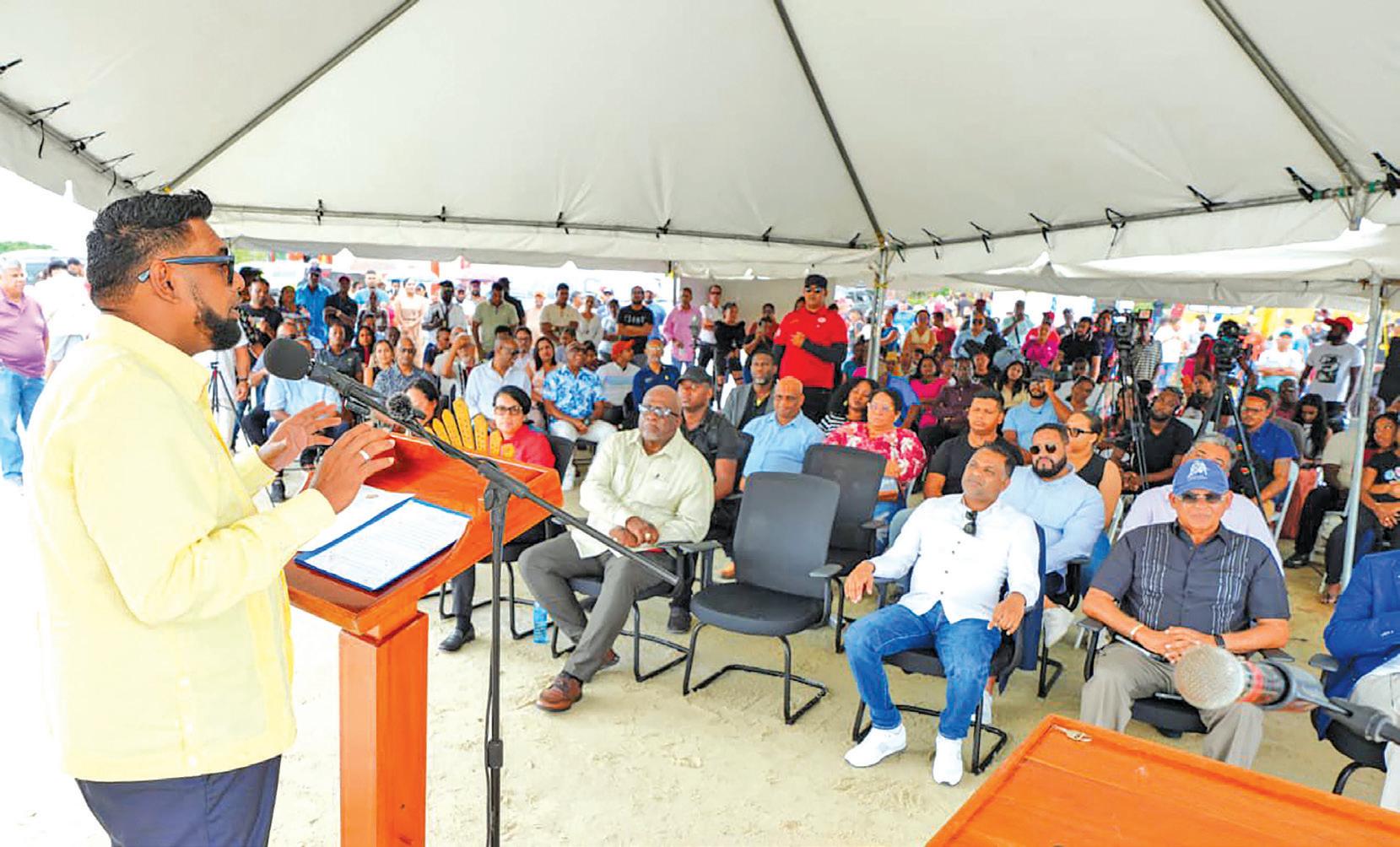
companies, and you build on your core business and expand, you are multiplying your wealth index. You are diversifying your business portfolio from within. But importantly, if you track the development of the company, it is in keeping with the expansion of our national development strategy,” he added.
Bartica’s transformation accelerates
pansion, new roads, drainage upgrades, and essential services. A new water treatment plant—capable of producing three million litres of treated water per day, is moving Bartica towards the Government’s goal of achieving 100 per cent access to treated water. In addition, the landing of a submarine fibre optic cable in 2025 has brought highspeed internet and 5G connectivity to the town. “Fast internet today is not a luxury,” President Ali said. “It is electricity for the mind.”
He described Bartica as central to this vision, noting that the town’s history has always reflected movement, connection and opportunity.
“Connectivity is the backbone of economic development, because it links people, goods, services and ideas,” he emphasised. Improved connectivity, he added, reduces transportation costs, opens new markets, enhances investor confidence and drives tourism, construction and innovation. He noted that the new hub will immediately save at least 20 minutes on regional connections and reduce operational costs for aviation operators by up to one-third.
The President outlined emerging opportunities made possible through modern infrastructure, including the use of drones to deliver emergency medical supplies and critical parts to hinterland mining camps in under an hour— cutting delivery times currently as long as nine hours. “These are the possibilities that are now enabled,” he said. Commending the BK Group of Companies for what he described as a “shrewd investment,”
President Ali said the aviation sector is modernising rapidly, but must now
The Electoral Communications Specialist noted that communication was used as a unifying tool, explaining:
“Communication became the bridge that united communities, curbed misinformation, and built trust. Strengthened engagement with stakeholders made the process more inclusive and widely accepted.”
A central Media Centre established on election day created a single hub for journalists and observers to access timely updates and briefings, strengthening transparency and improving the flow of verified information.
Smooth operations across a challenging landscape
According to organisation, Guyana’s vast geography demands a complex operational effort to ensure every citizen can vote. With UNDP support, GECOM completed assessments of 2,790 polling stations throughout the country, enhancing accessibility across coastal, riverine, and hinterland communities. The Commission
also trained 13,925 polling officials to uphold fairness, transparency, and efficiency on election day. Sensitive materials—including ballots, ballot boxes, indelible ink, and forms—were securely procured, verified, and distributed under strict oversight by political party agents.
These detailed measures contributed to strengthening Guyana’s democratic values by ensuring that citizens across all regions could participate in shaping their country’s future.
Reflecting on these efforts, UNDP’s Operations and Logistics Specialist highlighted the spirit of the electorate:
“Beyond systems and logistics, what stood out was the commitment of citizens. Their resilience and diversity gave meaning to every ballot cast.”
Furthermore, UNDP supported GECOM in enhancing its in-house Statement of Poll (SoP) Upload System by strengthening cybersecurity safeguards. This ensured that results continued to be uploaded secure-
ly even when the public-facing website temporarily experienced outages. In addition, the upgraded Results Tabulation Application was deployed across 20 counting centres nationwide and was praised by both domestic and international observers for its clarity, efficiency, and user-friendly interface.
The UNDP IT Specialist emphasised the importance of aligning technology with existing electoral laws and procedures, stating:
“Technology is the backbone of credible and resilient elections. When stakeholders understand the system and trust it, democracy is strengthened.”
UNDP Guyana reaffirmed its ongoing commitment to supporting democratic institutions and governance resilience. As Guyana continues its rapid development trajectory, UNDP pledged to maintain its partnership with GECOM and other national institutions to uphold transparency, inclusion, and trust—ensuring that democracy becomes stronger with each successive election.
adopt “more balanced pricing” to support consumers. He challenged air operators to reduce transport costs by at least 15 per cent, citing Government incentives such as tax and fuel concessions. “Public investment creates the environment, but private investment creates the opportunities,” he said. “This terminal proves that alignment of vision.”
The design of the new BK terminal was praised as modern, efficient and forward-looking, with the President noting that it will significantly enhance safety, comfort, commercial activity and tourism for Region Seven. “This investment... and their continuous investment in the economy, is part of an economic concept that is called a wealth multiplier index. Because as you integrate more in your
President Ali detailed the substantial investments made in Bartica in recent years, asserting that the town is rapidly evolving from a gateway to the interior into a fully diversified regional economic centre. In 2025, the Government commissioned the upgraded Bartica Stelling, part of a larger plan to modernise waterfront infrastructure, boost tourism, expand trade and integrate Region Seven into international commerce. Plans are also underway for a world-class marina that will position Bartica as a premier destination for yachting, boating and river tourism.
The town has seen major investments in housing ex-
Critical road linkages are also being developed. A national highway network will soon connect Bartica to the new Demerara River Bridge at Wales, and onward to Timehri, strengthening the town’s integration into the national transport grid. Once the BK terminal and new aerodrome are complete, Bartica will boast robust connections by river, road and air—an achievement few hinterland regions in the Caribbean can match. “Bartica will no longer be a gateway you pass through. Bartica will be the destination you go to,” the President declared.




An 18-year-old girl tragically lost her life on Sunday afternoon following a collision along the Riverstown Public Road, Region Two (PomeroonSupenaam).
The teenager, identified as Nayomi Singh of Huis't Dieren, Region Two, was the only daughter of her parents.
The fatal accident occurred at approximately 17:00h.
According to information reaching Guyana Times, Singh was proceeding along the Riverstown Public Road when she reportedly swerved to avoid a motorcyclist who was riding recklessly. In her attempt to avoid a collision, she lost control of the vehicle and slammed into a nearby light post.

The impact left extensive damage to the right front
(driver’s side) and right rear door area of the car.
Public-spirited residents rushed to the scene and pulled the teenager from the wrecked vehicle. She was taken to the Suddie Public Hospital, where she was pronounced dead on arrival by a doctor on duty.
The body was later transferred to the Suddie Mortuary, where it awaits a post-mortem examination.
Police investigations into the incident are ongoing.

Corentyne minibus smash-up
family ...says death of beloved educator “tore our entire lives apart”
The Bushlot Secondary School teacher, who suc cumbed to his injuries on Saturday following a minibus crash at Number 63 Village, Corentyne on Friday while transporting school students home after sports, was the go-to driver for school outings, accord ing to his family. Jerome Bernard, 30, had been teaching at the school for the past ten years.
Speaking on Sunday with this publication, Bernard’s aunt Brenda Lewis, in an emotional in terview, reflected on his life of service, his love for sports, and the painful loss that has shattered the family. Lewis confirmed that Bernard, who had been a teacher for 10 years, was not only experienced in taking students to school events but had been licensed to drive for decades. She said he routinely drove for school outings and athletic meets.


and had no children.
“He was a poor, sincere boy… he used to say, ‘Aunty, I don’t want to make children out of marriage. When I am married, then I will make my child.’”
She said she had often told him she looked forward to celebrating his wedding, never imagining the family would instead be preparing for his funeral.

The PPP will never learn, will they?? Here it was, the EU Observer Mission had just chastised them for exploiting the advantages of “incumbency”!! That’s being the Government, for those not paying attention at the back of the class! – to create “an uneven playing field” for the Opposition!! You know…opening schools, hospitals, roads, bridges etc, where their big wigs in Govt show up and get free media coverage!! Yet, what are they doing right now?? That’s right – opening up solar farms; announcing total WiFi coverage of the hinterland; doling out house lots to submerged folks in Berbice etc!! And getting that media coverage!! Not only from the State media but the Opposition-aligned ones!!
OK…OK…your Eyewitness knows that elections are five years away. But wouldn’t the PPP be crowing about the additional tens of thousands of lots handed out – not to mention making GT the showpiece of the Caribbean – etc when those elections roll around? And wouldn’t that be the “incumbency advantage” the EU insisted they exploited?? The question, of course, is what should the Government do?? Should they invite Opposition politicians to these unveilings and announcements?? Will those worthies show up since the EU insists they’re part and parcel of our democratic system?? Your Eyewitness has his doubts seeing as to how after the elections before this one, the LOO – the Opposition Leader, not the John!! – refused to even shake Prezzie’s hand – much less join in ribbon cutting!!
So should the Government self-effacingly hide their (many) lights under a bushel – or as many bushels as it takes? But wouldn’t folks quickly latch on to the fact that under the bushels popping up all over the country were Government achievements?? Bushels here and bushels there might then be condemned by the next EU-EOM in 2030 as signalling that “uneven playing field” they’d complained about!! Hadn’t the PPP realised that elections are no playing matter – and that the playing field should be even??
But your Eyewitness thinks he’s got the solution to the dilemma posed by the EU-EOM. Why don’t the “free press” media also cover the (myriad?) activities of the Opposition?? Equal opportunity and equal treatment and all that – the “free press” proclaimed mantra!! Before writing this piece, your Eyewitness scoured the Opposition parties’ Facebook pages – “I’m on Facebook, therefore I exist!! - and there were oodles of cover-worthy earthshaking activities!! In all fairness he couldn’t see head nor hair of (bald?) PNC leader Norton – but there was Sanction Man who’d ousted him!! He was arguing with a bearded fella about some Leguan Masjid big ones tearing out a Mandir habitué’s flower plants!! Of national import, innit??
Norton’s parliamentary rep Chicken Man was on a walkabout – sadly not handing out Chicken legs – but still!!
…governmental excitement
“He always take them out… this is not the first time,” Lewis said tearfully. “Whether it’s cricket, whether it’s athletics, he was just there. He loved sports, he loved children… he went to nationals, he went to all the activities in this region.”
According to Lewis, Bernard transported the students on Wednesday and Thursday without incident. On Friday morning—the day of the tragedy—he passed by her home as usual. “He came to me, he said, ‘Aunty, I’m going to take the children.’ I said, ‘Okay, go, travel safe.’ But at the dot of 5, 6 o’clock, we had the horrible, horrible news… that was it for the entire family.” The grieving aunt recalled the agonising hours that followed, receiving word of the accident, rushing to the hospital, and being met with the grim reality that the injuries were severe. “When we reached there… it was ter-
rible, terrible, terrible. But we can say he had the support of all the doctors. They tried, but God knows his place.”
Lewis described Bernard as his mother’s only child, a gentle and respected figure within the extended family. “He is my nephew, but he was like a child to each and every one of his cousins… a role model. Jerome’s [death] tore our entire lives apart; the entire Lewis and Bernard family from that Friday night.”
Bernard’s mother, she said, is unable to speak and remains devastated.
Lewis also shared that Bernard was not married
As the community continues to mourn the loss of both teacher and student, relatives say they hope the tragedy sparks urgent attention to road safety and stray animal control so that acts of dedication like Bernard’s are never again met with such devastating endings.
Sixteen-year-old Jodea Seline and 30-year-old teacher Jerome Bernard lost their lives in the tragic accident when the school bus transporting students reportedly swerved to avoid an animal that ran onto the roadway. The vehicle toppled several times before coming to a halt, leaving both Seline and Bernard fatally injured and 16 other students hurt, several of whom were rushed to hospital for emergency treatment.
Police are continuing their investigations.
Our Eastern neighbour Suriname just celebrated 50 years – their Golden Jubilee – of independence!! Your Eyewitness is a tad jealous because while we were ahead of them in this regard, their post experience was so much more newsworthy!! Right off the bat – scarred by OUR preIndependence violent PNC-inspired racial riots – 100,000 of their citizens fled to Holland in 1973, the year before their independence!! But in a gesture that our British overlords never made, the Dutch gave the new government a golden handshake of 3.5 million Dutch Guilders – equivalent to US$1.7 billion!!
Then within a decade, they had an army coup by the drug-trafficking, former army Sergeant Bouterse – who executed a dozen civil society activists – and ruled as a dictator for over a decade!! During which their Maroon African tribes in the jungle – who’d fled there during slavery – waged a guerilla war of secession!! The Surinamese so liked Bouterse’s rule that they later ELECTED him to office!! Now they’re about to enjoy the joys of oil!!
…infiltration
The Brazilian army just completed a joint operation to monitor our common south-western border – through which Venezuelans may infiltrate. We should now invite the US Marines who were in T&T to do the same in our Cuyuni River border!!


Prime Minister Brigadier (Ret’d) the Honourable Mark Phillips on Sunday joined hundreds of participants in Georgetown for the Men on Mission (MoM) International Men’s Day Walk, an activity that also marked the third anniversary of the national movement aimed at strengthening families, empowering young men, and supporting vulnerable households.
The early-morning walk brought together members of the Joint Services, government officials, community groups, private-sector partners, and families. Against this backdrop, the Prime Minister delivered an address that blended pride, reflection, and a renewed call for responsible male leadership across Guyana.
Opening his remarks, Prime Minister Phillips said he stood “with deep pride and gratitude,” telling participants that they walked “not just for fitness or formality, but for purpose, unity, and commitment to building a stronger, more compassionate Guyana.” He commended the turnout and noted that the presence of men, women, and youth reflected the movement’s growing national impact.
Prime Minister Phillips reminded the gathering that when the initiative was launched by President Dr Irfaan Ali, the intention was straightforward but ambitious.
“A simple yet powerful idea” that grew into national transformation
“When we launched Men on Mission, the idea was simple yet powerful: to create a movement that helps men become their best selves so they can better serve their families, their communities, and our country.”
The Prime Minister noted that three years later, that vision has become a lived reality through the efforts of volunteers, officers, and organisers across all ten administrative regions.
He pointed out that the initiative has already supported the construction and repair of homes for pensioners, single parents, persons living with disabilities, and families displaced by fires and other disasters. Many of these interventions, he remarked, restored “dignity and hope to households that had none.”
Prime Minister Phillips said one of the proudest achievements of Men on Mission is its expanding work with at-risk boys and young men.
He highlighted that the programme now provides mentorship, literacy support, life-skills training, and confidence-building activities for young males who previously lacked support systems or positive direction.
“Many of these young men are now on a new trajectory because someone from Men on Mission took the time to guide, teach, and encourage them,” he noted.
He also emphasised MoM’s
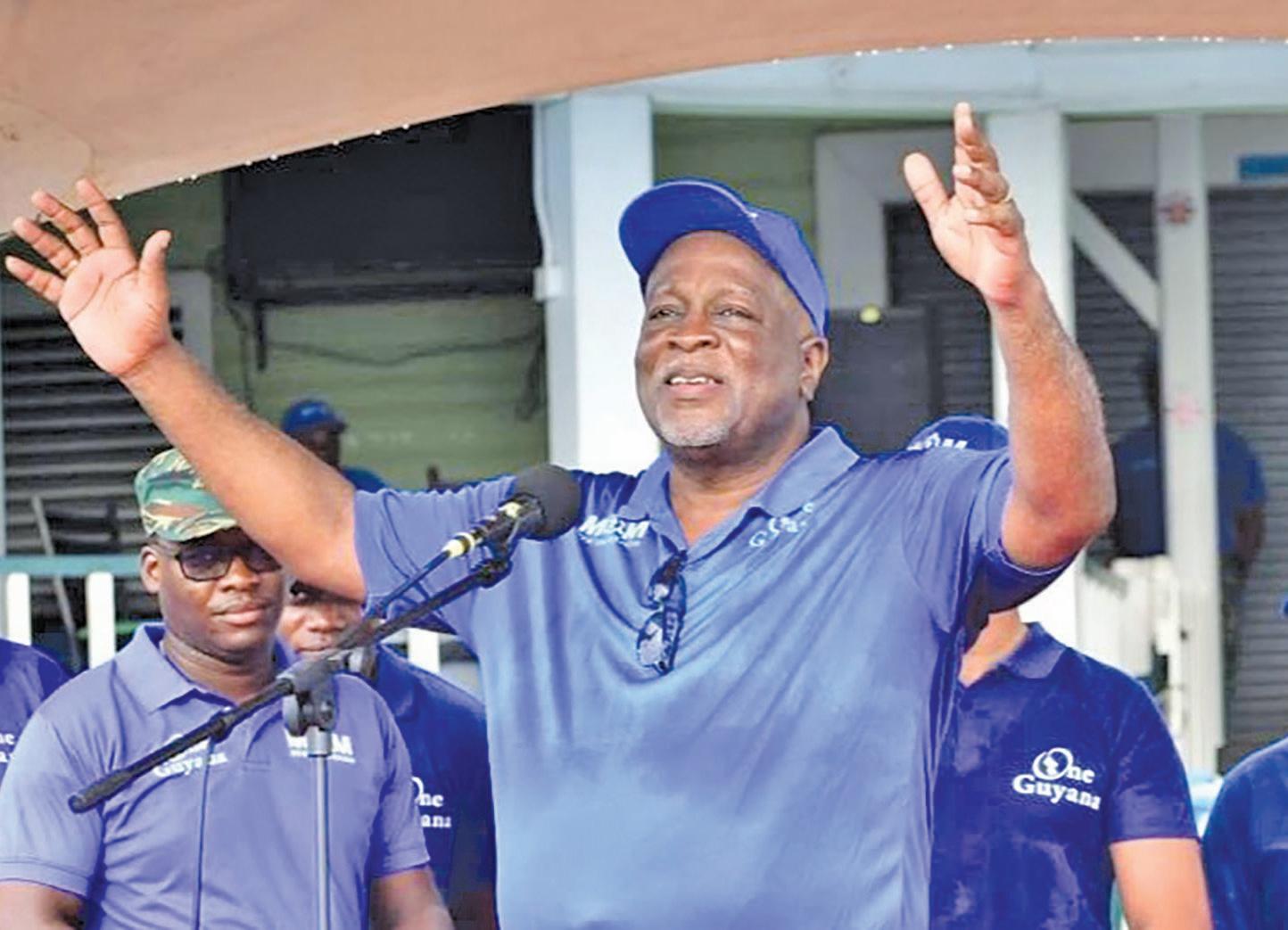
partnership with the prison system, which focuses on rehabilitation and reintegration programmes.
According to the Prime Minister, the objective is to ensure that incarcerated men “re-enter society with purpose, skills, and discipline,” allowing them to contribute meaningfully to their families and communities.
The Prime Minister reminded participants that the movement has grown because it is grounded in service, not recognition.
Across Regions 1 through 10, he said, “MoM volunteers have shown up, not for praise, not for award ceremonies, but because
service is the highest form of leadership.”
He underscored the responsibility that men carry in shaping the next generation.
“This walk is not only a celebration. It is a reminder of the responsibility we carry to be protectors, to be builders, to be positive influences, and to be examples for the next generation of young men growing up in Guyana.”
Prime Minister Phillips also acknowledged the important role women have played in sustaining the mission, noting their consistent involvement in planning, outreach, and community support.
The Prime Minister encour-
aged those gathered to view the walk as a recommitment rather than a stand-alone event.
“You walked, not just for fitness or formality, but for purpose, unity and commitment to building a stronger, more compassionate Guyana,” he said, encouraging participants to carry that spirit of unity beyond the day’s activity.
He stressed that the focus must remain on uplifting boys, strengthening families, and shaping communities grounded in dignity, respect, and opportunity.
“Let this not be the end. Let it be a recommitment that each of us will continue to uplift one another, support our boys, strengthen our families, and build a Guyana where each citizen can live with dignity, respect, and opportunity.”
Prime Minister Phillips closed by reaffirming the movement’s mission.
“Together, let us continue to change lives, and we will continue to change our country for the better.”
The walk saw participation from several officials, including: Minister of Labour and Manpower Planning, Keoma Griffith; Chief of Defence Staff, Brigadier Omar Khan; Commissioner of Police, Clifton Hicken; Fire Chief, Gregory Wickham; Head of the Prison Service, Nicklon Elliot; Lt. Colonel Bhageshwar Murli; senior Joint Services ranks; private sector partners; civil society groups; and members of the public.


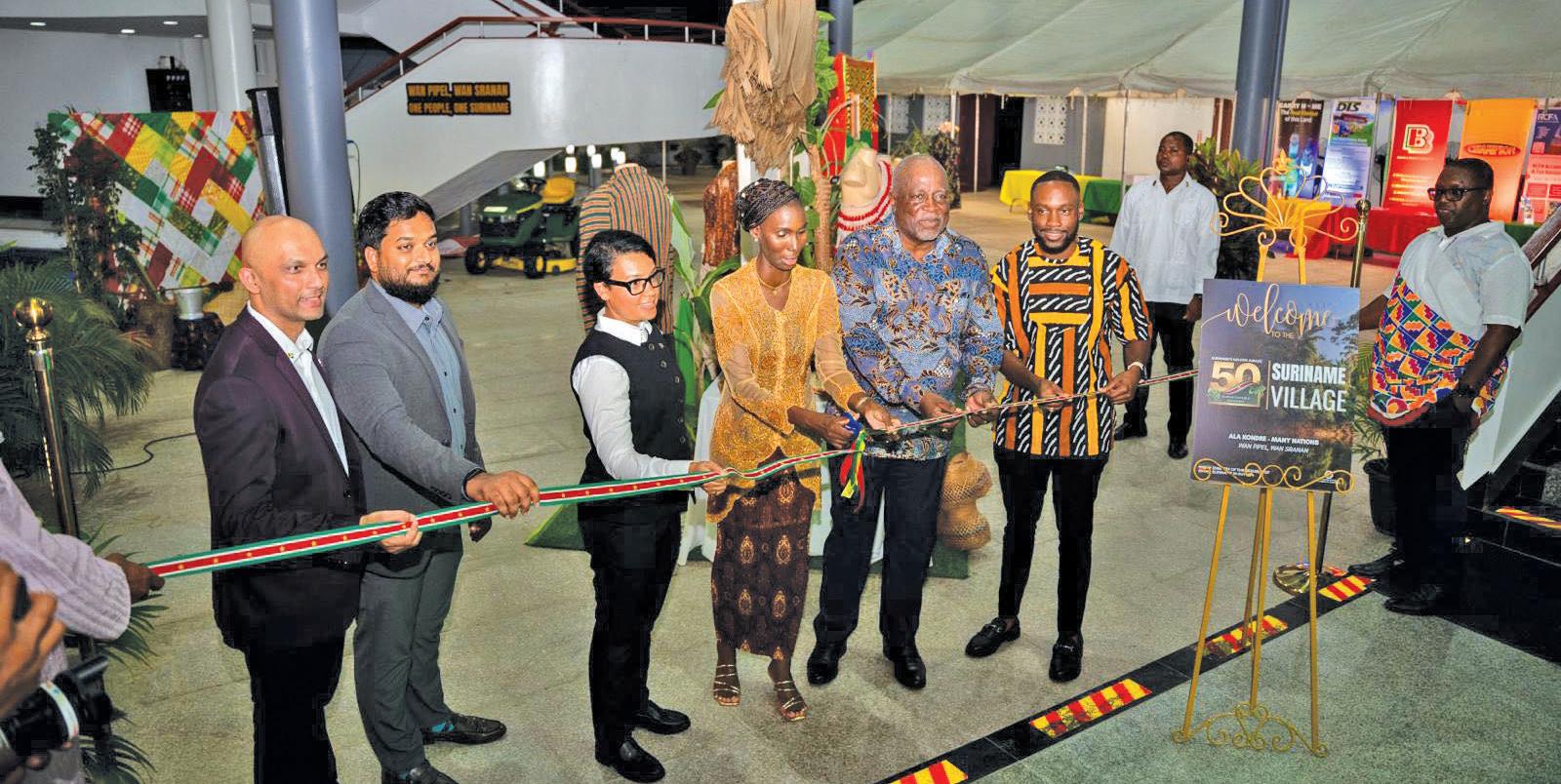

Guyana has reaffirmed its commitment to deepening cooperation with neighbouring Suriname, with Prime Minister Brigadier (Ret’d) Mark Phillips declaring that the two states remain firmly bound by geography, shared development goals, and a strong foundation of mutual respect.
The Prime Minister delivered the remarks on Saturday evening at the Arthur Chung Conference Centre, where Guyana joined
Suriname in celebrating its 50th independence anniversary.
Addressing dignitaries, diplomats and members of the private sector, Prime Minister Phillips extended warm congratulations to the Government and people of Suriname on reaching their Golden Jubilee milestone. He praised the country’s cultural pride, national resilience and progress over the past five decades, noting that the celebration coincides with another significant mark-
er—50 years of formal diplomatic relations between Guyana and Suriname.
In his featured remarks, the Prime Minister highlighted the enduring and strategic ties between the two nations, describing them as “neighbours by geography, partners by necessity, and friends by choice.” He noted that the bilateral relationship has matured into one defined by cooperation across multiple sectors, including regional integration efforts, people-to-people con-

nections, and shared aspirations for economic prosperity.
“Guyana and Suriname have set an example for the region and the world— showing that neighbours can collaborate meaningfully; that shared development is not a slogan but a practical path forward,” he stated. “Whether in energy, infrastructure, trade, security, or people-to-people connections, our cooperation reflects the maturity and trust that our leaders have worked tirelessly to build and maintain.”
The Prime Minister reaffirmed Guyana’s dedication to strengthening these partnerships, particularly as both nations advance plans
to transform the Guyana–Suriname corridor into a model of regional integration. He emphasised ongoing collaboration in areas such as food and energy security, climate resilience, cross-border infrastructure development, and sustainable growth.
“Guyana recommits to working together to transform the Guyana–Suriname corridor into a model of regional integration; to deepen collaboration in food and energy security, climate resilience, and sustainable development,” he said, stressing that both countries stand to benefit significantly from sustained cooperation.
Saturday’s celebration, attended by senior govern-
ment officials, members of civil society, and the diplomatic corps, was jointly hosted by the Embassy of Suriname in Guyana and the Suriname–Guyana Chamber of Commerce (SGCC). The event marked not only Suriname’s 50th Independence Anniversary but also half a century of diplomatic relations between the two nations—an occasion described as historic and symbolic of the strong regional bonds the two states continue to nurture.
Suriname’s Ambassador to Guyana, Her Excellency Liselle Blankendal, along with Prime Minister Phillips’ wife, Mignon Bowen-Phillips; Minister of Tourism, Industry and Commerce, Susan Rodrigues; and Minister of Labour and Manpower Planning, Keoma Griffith, were among the dignitaries in attendance. The high-level cultural gathering showcased Surinamese heritage and underscored the shared cultural and economic ties that continue to strengthen bilateral cooperation.
The Embassy and SGCC expressed appreciation to Guyana’s media and private sector for supporting the celebration, noting that the anniversary serves as a meaningful reminder of the two countries’ shared history and future prospects.



Guyana’s landmark outward investment mission to Europe has completed its first leg in France, with Chief Investment Officer and newly appointed Member of Parliament, Dr. Peter Ramsaroop, describing the engagements as a strong launch to the eight-day tour.
The Guyana–EU Global Gateway Study Tour, which brings together senior government officials and leaders from the private sector, is aimed at deepening trade, logistics and agro-processing partnerships with some of Europe’s most advanced institutions.
The delegation’s work in France saw high-level interactions in Paris and Marseille, where members studied Europe’s leading port, logistics, and digital transport systems. These included meetings with HAROPA Port at the Port of Gennevilliers, a detailed tour of the Port of FosMarseille and its eastern basin, and technical exchanges with MGI—the developers of Ci5, one of Europe’s most sophisticated Port Community Systems. Collectively, these sessions provided real-time exposure to integrated digital platforms, multimodal transport, and efficient public–private collaboration— factors that define mod-
ern port governance and supply-chain management across the EU.
Reflecting on the start of the mission, Dr. Ramsaroop noted that the lessons from France are directly applicable to Guyana’s current phase of rapid economic expansion and infrastructural transformation.
“France gave us an excellent start,” he said. “The insights from these ports and logistics companies are directly relevant to Guyana’s growth. As we move into the next countries, we will build on this momentum by engaging the EU’s leading institutions and private-sector partners. The upcoming meetings with DG INTPA, DG AGRI, and a range of European businesses will deepen our understanding of how Guyana can strengthen its connectivity, infrastructure and agri-export pathways.”
The next phase of the tour will take the delegation to Brussels for engagements with the DirectorateGeneral for International Partnerships (DG INTPA) and DG AGRI, as well as key discussions with European dredging associations, seaport organisations, cruise liners, and multiple chambers of commerce. These sessions are expected to expand partnership options
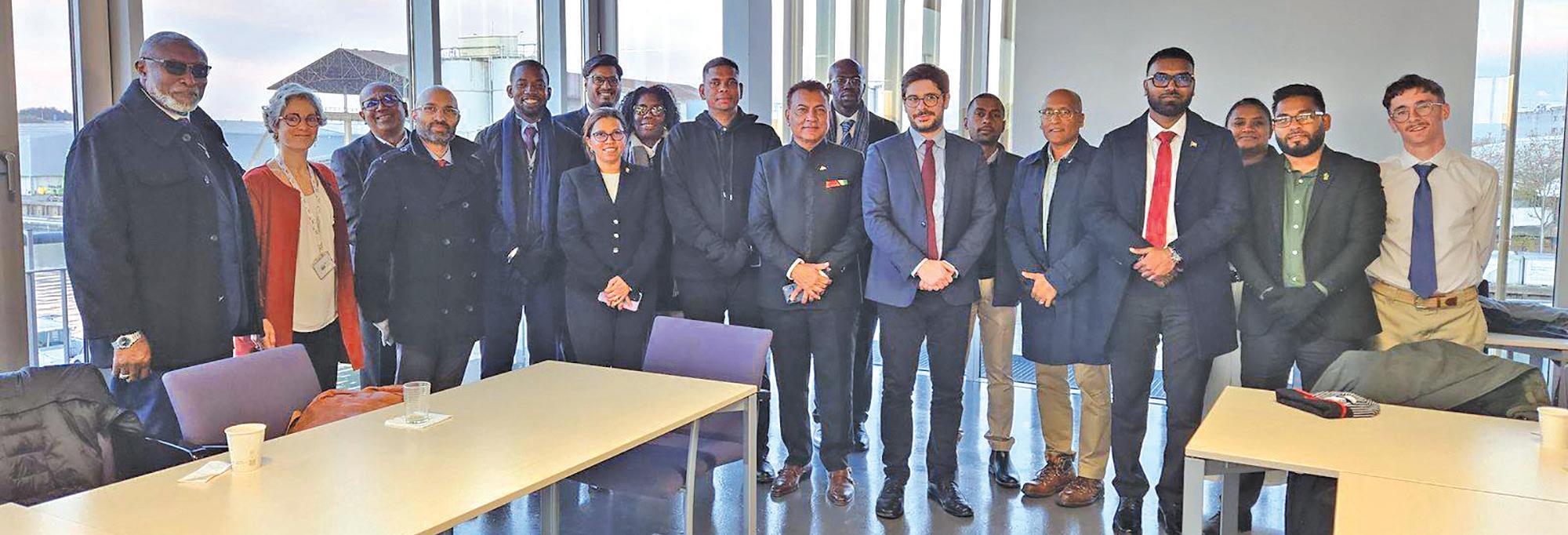
for Guyana’s growing maritime, logistics, and agri-processing sectors.
Members of the private sector participating in the mission also emphasised the value of the France leg.
Guyana improves its export systems. The lessons here will support competitiveness for our agro-processors and wider business community while ensuring financial sustainability of port op-
Ramnarine, is participating alongside representatives from GO-Invest, the Maritime Administration Department (MARAD), the National Agriculture Research and Extension
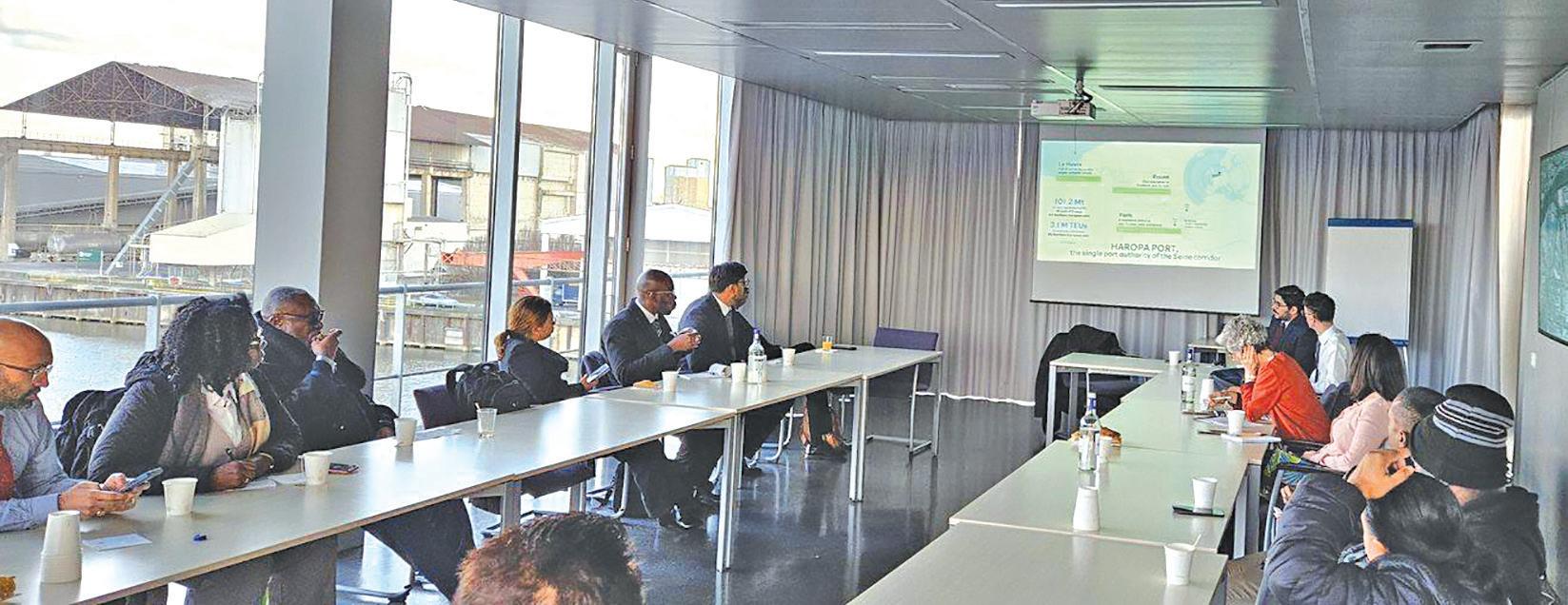
VEHSI Director, Nicholas Deygoo-Boyer, highlighted the strategic takeaways from observing one of the world’s most technologically coordinated port systems.
“The level of coordination between technology, governance and industry in the French port system shows the kind of modernisation Guyana can work toward even as it builds out new port infrastructure. These engagements gave us a clear picture of what is achievable,” he stated.
GMSA President, Rafeek Khan, pointed to the importance of Europe’s integrated logistics and agri-supplychain models.
“Understanding how Europe integrates logistics and agri-supply chains provides valuable direction as

erations,” he added.
The high-level mission— formally endorsed by the Private Sector Commission (PSC)—is the first of its kind for Guyana and represents a major step in positioning the country as a future logistics and agro-processing hub for the Caribbean and South America.
The PSC’s Executive Director, Nayteram
Institute (NAREI), the CARICOM Private Sector Organisation (CPSO), VEHSI, Crane Guyana Inc., Guyana Port Inc., Western Logistics Guyana, Banks DIH Ltd., DDL, UMAMI Inc., and other private-sector stakeholders. Delegates from Antigua, Barbados, St. Vincent and the Grenadines, the EU Delegation, and FIAP have also joined the
mission, widening the platform for regional collaboration.
Over the coming days, the delegation will visit the ports of Antwerp-Bruges, Rotterdam, and Málaga— global leaders in sustainable port innovation and digitalisation. Academic sessions, including technical exchanges with Wageningen University, will expose Guyanese officials and business leaders to modern agro-processing systems, advanced food-safety frameworks, and key strategies for improving market access.
With France now concluded, the mission transitions into its next critical phase in Belgium, the Netherlands, and Spain. Delegates say the momentum gained so far has already set a strong foundation for the remainder of the tour, which is expected to deliver new pathways for investment, trade expansion, and long-term infrastructure transformation in Guyana.
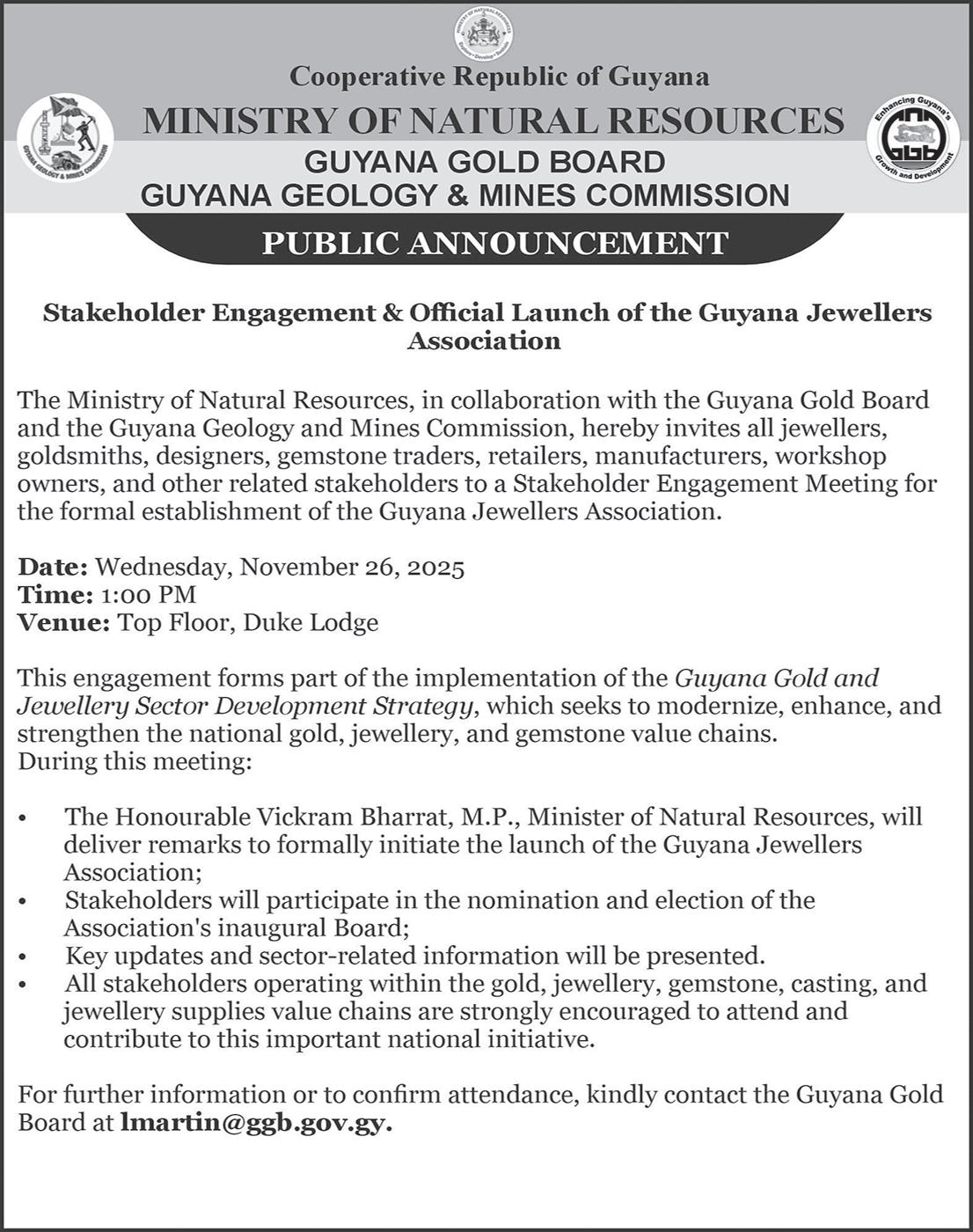

Men on Mission (MoM) on Saturday commemorated its third anniversary with a fitness walk through some streets Minister, Brigadier (Retired) Mark Phillips; Commissioner of Police, Clifton Hicken; Chief of Defence Staff, Omar Bhageshwar Murli, among other senior officials. The 05:30h walk began at the Everest Cricket Ground on Camp
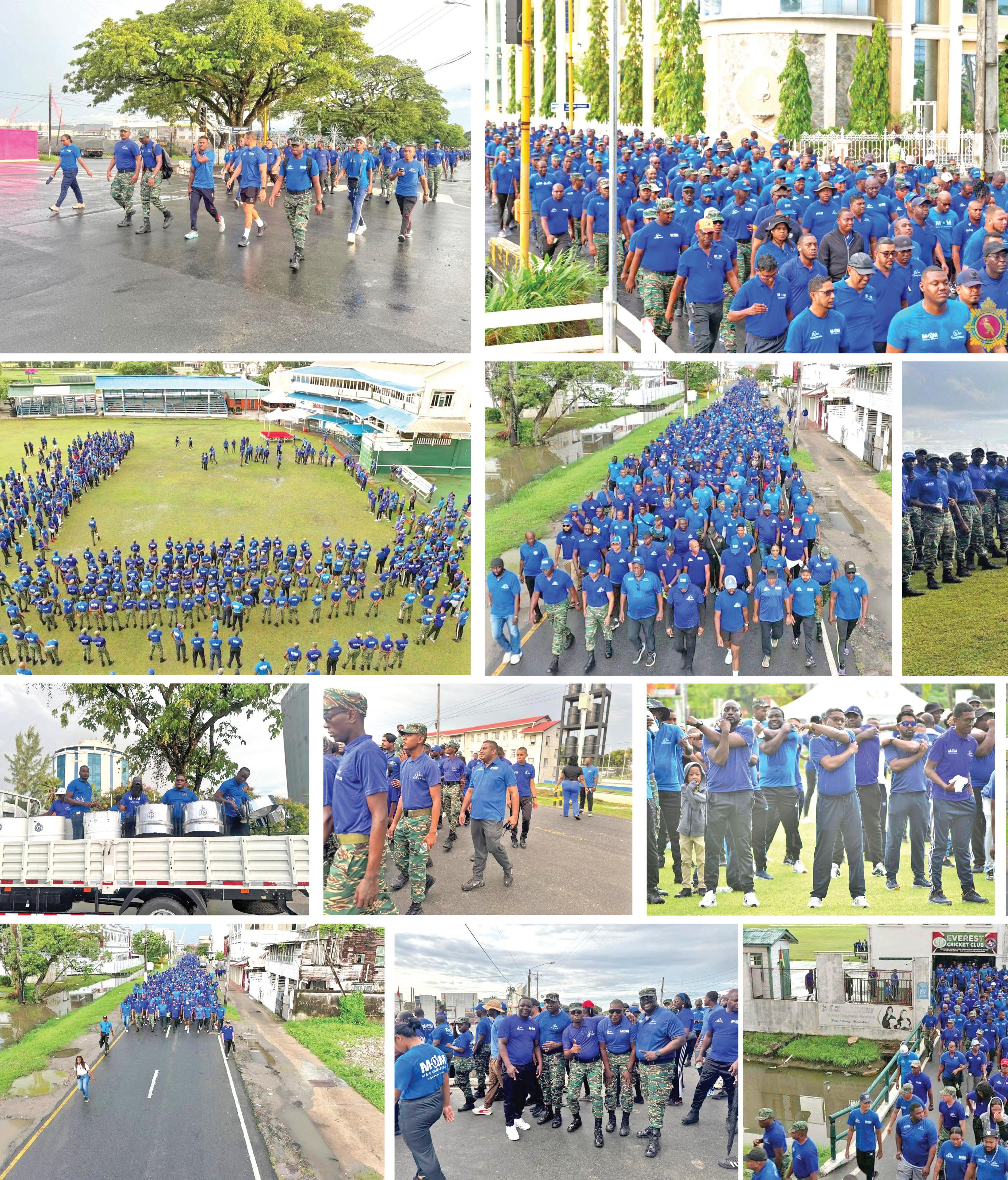
streets of Georgetown and a “warm-down’ back at the Everest Cricket Ground. The large contingent included Prime Omar Khan; Fire Chief, Gregory Wickham; Head of Guyana Prison Service, Nicklon Elliot; and Lieutenant Colonel Camp Road, before proceeding through Eve Leary, Main Street, Church Street and Camp Street (Photos: GDF, GPF)
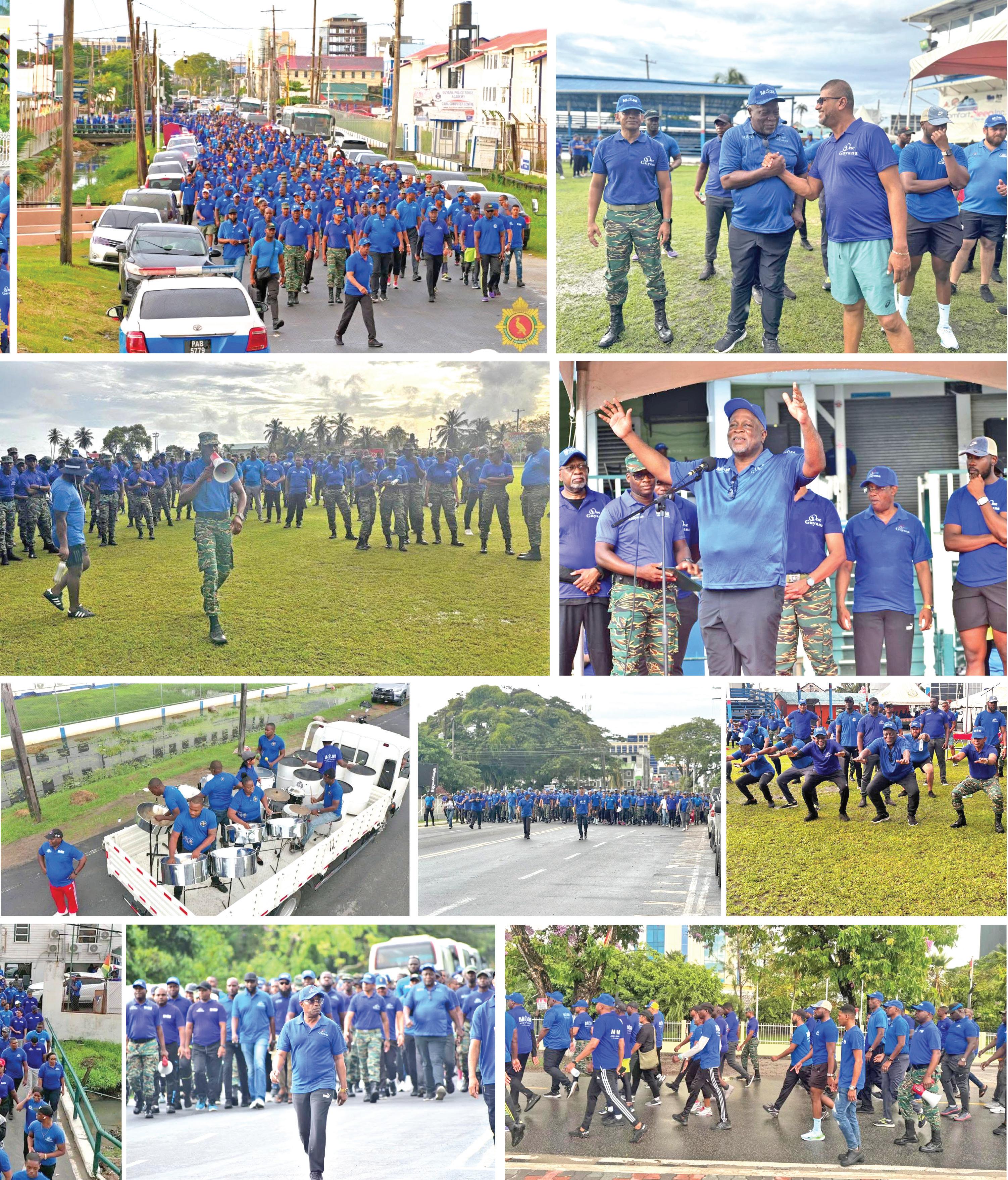


Professor Clement Sankat, one of the Caribbean’s most accomplished tertiary-education leaders, was honoured with an Honorary Doctor of Engineering degree during the University of Guyana’s 59th Convocation on November 20, 2025.
The recognition follows his recent return to Guyana to lead the Guyana Technical Training College Inc. (GTTCI), where he is steering the country’s most ambitious effort yet to train Guyanese for the oil and gas sector and related industries.
Receiving the honorary title, Prof. Sankat told the gathering that he accepted it “with profound humility,” describing the distinction as deeply meaningful coming from his homeland.
“There is something deeply emotional about being rec-
ognised by one’s own country,” he said, adding that wearing the university’s regalia made him feel “the weight of history, gratitude, and a personal sense of coming home.”
He extended appreciation to UG’s leadership, noting, “I will forever carry this honour with pride, and I commit to always supporting our national university.”
Prof. Sankat’s recent return to Guyana is central to understanding the importance of the honorary degree. Born in No. 64 Village, Corentyne, he spent decades leading major universities across the region, including serving as Principal of the University of the West Indies, St. Augustine Campus, and later as President of the University of Belize. He revealed in a recent interview on ‘Starting Point’ that he returned at the direct
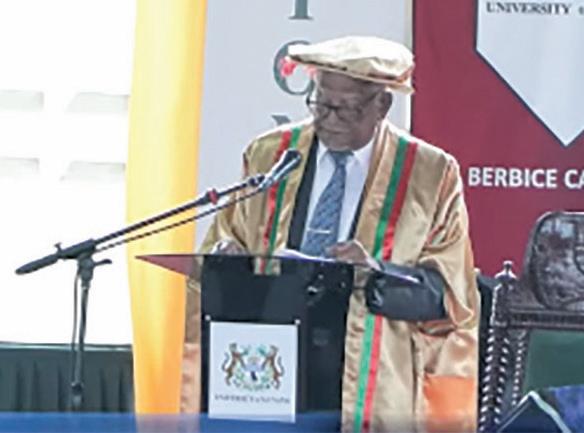
invitation of President Dr. Irfaan Ali and Vice President Dr. Bharrat Jagdeo, who encouraged him to help build the country’s technical training capacity. According to the professor, he was asked to develop a concept paper that laid the foundation for estab-

The US Navy and the Guyana Defence Force (GDF) successfully completed a Passing Exercise (PASSEX) within Guyana’s territorial waters on Saturday, November 22 between the USS Mahan and the GDFS Shahoud.
The exercise strengthened coordination between the U.S. Navy and the GDF Coast Guard, enhancing interoperability for future tactical and contingency operations with partner nations and reinforcing US and Guyana's strategic security partnership.
According to US Southcom, a PASSEX is an exercise conducted between two or more navies to ensure best practices for communication and cooperation, and normally includes communication and manoeuvring drills.
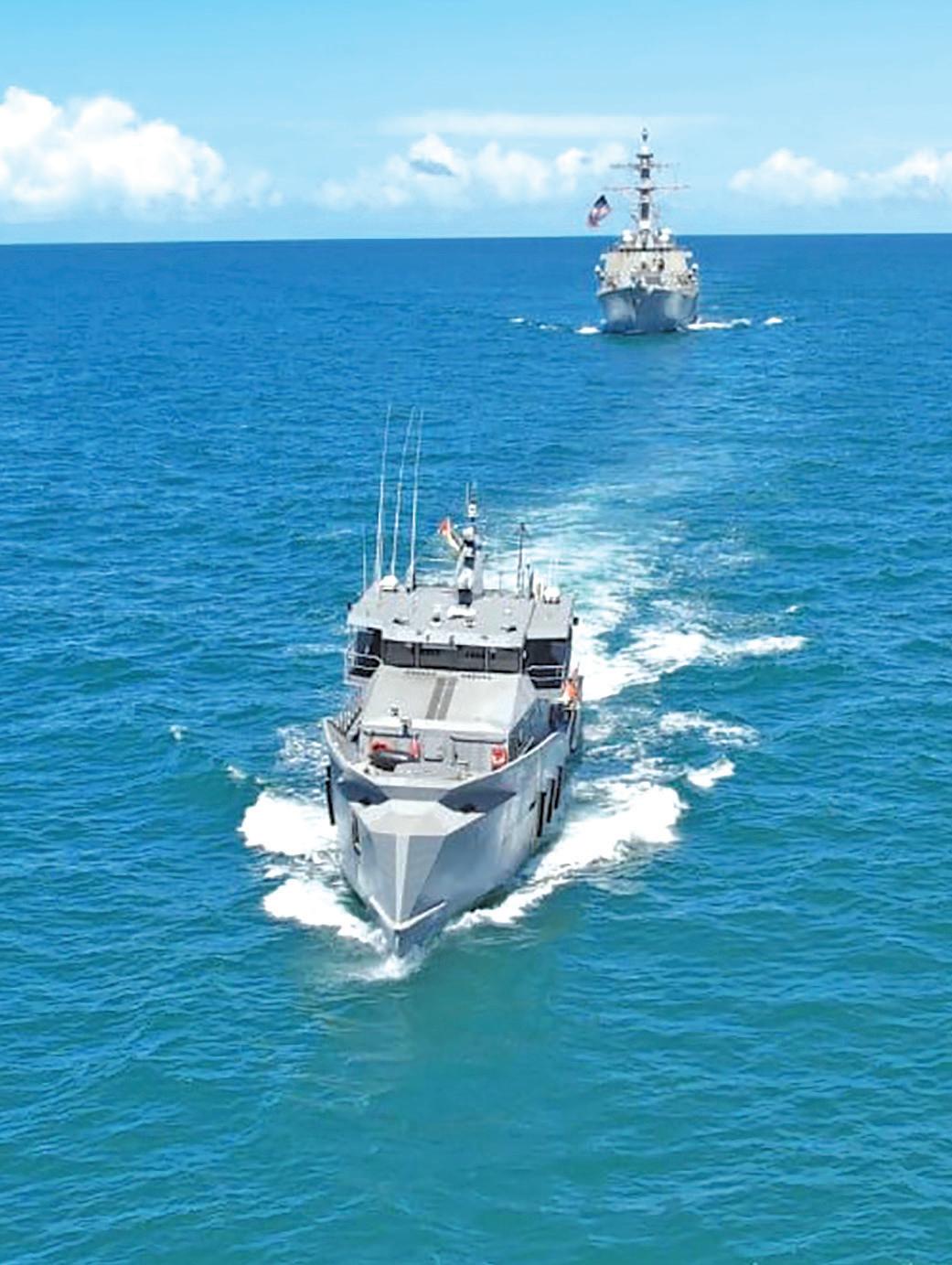
lishing GTTCI, now Guyana’s flagship oil and gas technical-training institution.
Reflecting on the opportunity, he said he was “extremely grateful” to be able to give back to the country of his birth after decades of regional service.
In his convocation address, Prof. Sankat told graduates that they were entering a country undergoing extraordinary change. “Our country is experiencing transforma-
tion in energy, engineering, agriculture, forestry, environmental protection, ICT, health, and education. The pace is extraordinary. The world is watching Guyana with awe, and with expectation.”
But he cautioned that long-term development depends on institutions and people rather than natural wealth alone. “Natural wealth alone does not make a nation great. Institutions do.
People do.”
Since assuming leadership at GTTCI in Port Mourant, Prof. Sankat has prioritised creating a worldclass technical workforce capable of supporting Guyana’s expanding petroleum and industrial sectors.
GTTCI’s location in rural Berbice was deliberate, intended to stimulate regional development and eventually support a “college town” economy in Port Mourant.
Prof. Sankat used his convocation address to offer graduates 13 guiding principles for professional life. Among them were appeals
for lifelong learning, reliability, sound judgment, ethical behaviour, and humility. He also emphasised that “AI, remote sensing, drones, automation… these are not the future; they are the present,” urging graduates to embrace new technologies as part of their professional growth.
Prof. Sankat has spent more than seven decades shaping educational institutions across the Caribbean. His philosophy is rooted in the belief that national development must be built on strong systems, high-quality training, and people of character.
“In the end, Guyana’s success will not be measured by how much oil we extract… It will be measured by the competence of our people, the strength of our institutions, and the character of our nation.”
He closed by encouraging graduates to step confidently into a changing Guyana. “Graduands of the University of Guyana, go forward with purpose, excellence, courage, and pride.”
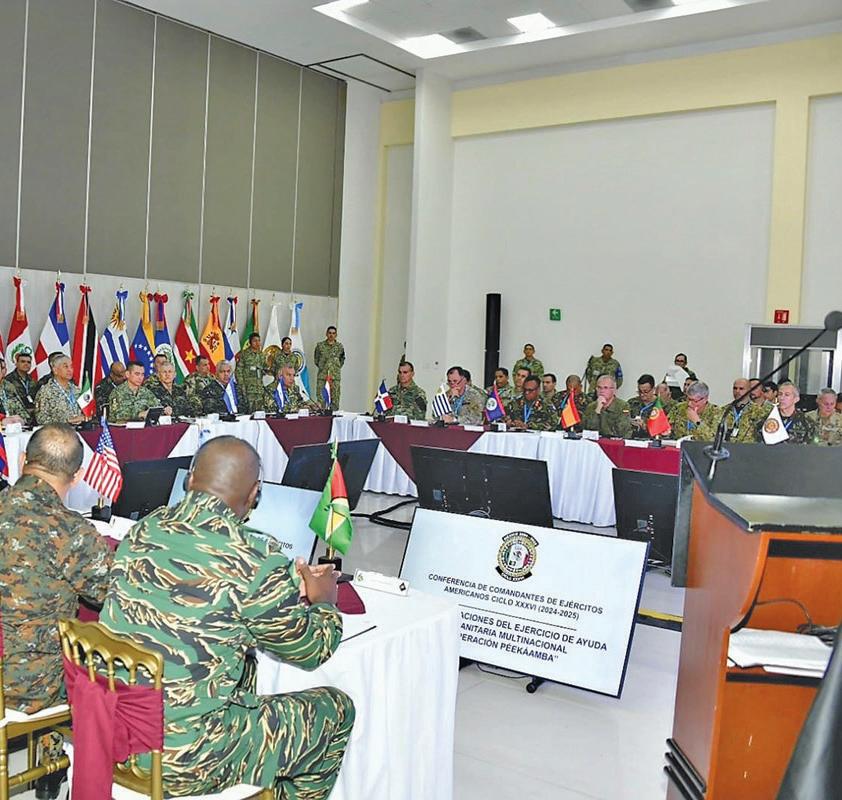
Senior officers of the Guyana Defence Force (GDF) recently represented the country at the closing session of the 36th Cycle of the Conference of American Armies (CAA), a major hemispheric security forum held in Mexico City that brought together army commanders and senior military leaders from across the Western Hemisphere.
Colonel General Staff Colonel Kenlloyd Roberts, MSM, attended the meeting on behalf of the Chief of Defence Staff, Brigadier Omar Khan, MSS, reaffirming Guyana’s active involvement in regional military cooperation and strategic dialogue. He was accompanied by Lieutenant Colonel Loring Benons, Commanding Officer of the 31 Special Forces Squadron.
The CAA, which consists of commanders of 24 armies across the Americas, serves as a longstanding platform
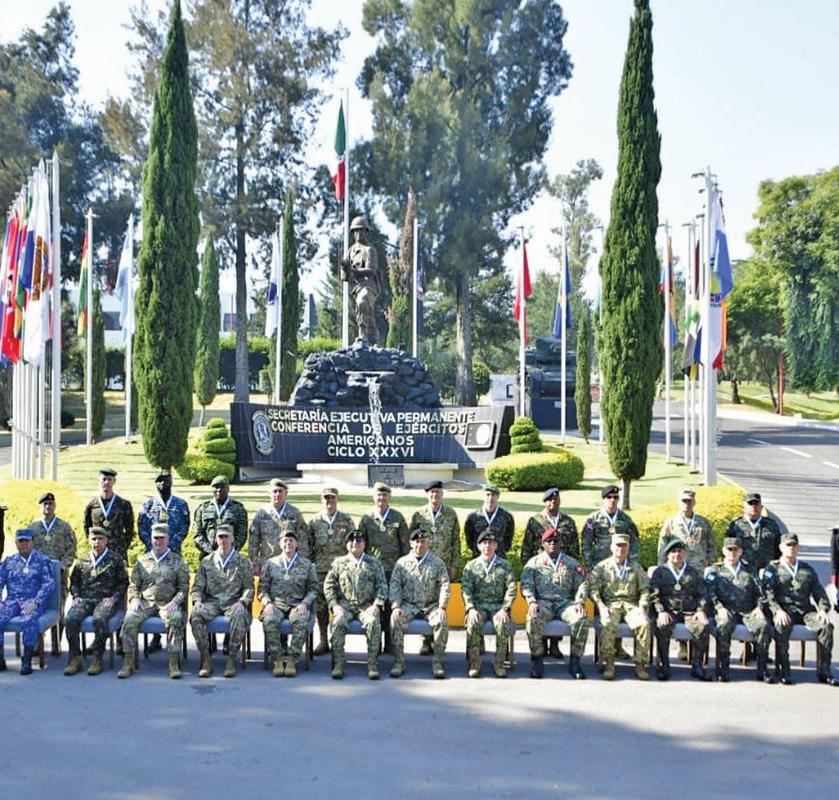
for senior army leaders to engage on shared security concerns, operational challenges, and opportunities for enhanced collaboration. This most recent cycle brought renewed attention to the evolving security landscape in the hemisphere.
Throughout the conference, delegates examined several high-priority issues, including interoperability among regional forces, strategic communication, humanitarian assistance and disaster response, cybersecurity readiness, and emerging regional threats.
The discussions highlighted the need for shared approaches to strengthening defence capabilities amid an increasingly complex security environment.
Delivering remarks during one of the plenary sessions, Colonel Roberts underscored the importance of hemispheric cooperation and sustained dialogue among member
states. He noted that the work of the 36th Cycle reaffirmed a collective commitment to peace, stability, democratic values, and readiness across the region. He also emphasised that Guyana remains fully aligned with initiatives aimed at bolstering regional security and deepening partnerships among member armies. According to the GDF, Colonel Roberts’ participation reinforced Guyana’s role in shaping multinational defence conversations and contributing to shared approaches to security in the Americas. His presence at the high-level meeting further strengthened Guyana’s visibility and engagement within the Conference of American Armies, demonstrating the country’s commitment to collaboration, preparedness, and collective problem-solving in an era of regional security challenges.

Antigua and Barbuda’s Ambassador to the United States (US) and Permanent Representative to the Organisation of American States (OAS), Sir Ronald Sanders, received an Honorary Doctor of Laws (LLD Honoris Causa) from the University of Guyana (UG), which recognised his distinguished contributions to Caribbean diplomacy, governance and international advocacy. The honour, conferred at UG’s convocation ceremony, on November 22, celebrates Sir Ronald’s decades of leadership in regional integration, global diplomacy and the defence of small states within the international system. In his acceptance address, delivered to the Vice-Chancellor, faculty, officials, and graduating class, Sir Ronald expressed profound gratitude, describing the recognition as both
humbling and deeply meaningful.
“I accept this Doctor of Laws, honoris causa, with deep humility,” he told the gathering, adding thanks to the graduands “for allowing me to share this moment— the first day of the rest of their lives.”
One Guyana: more than a slogan Sir Ronald used the platform to reflect on Guyana’s current moment of national evolution, particularly under the banner of “One Guyana”; a concept he described as “an article of faith” rather than a slogan. He praised President Irfaan Ali’s vision for a society rooted in equal opportunity, inclusive development, and shared prosperity. The idea of “One Guyana,” he emphasised, is a national covenant—one shaped by the long history of struggle
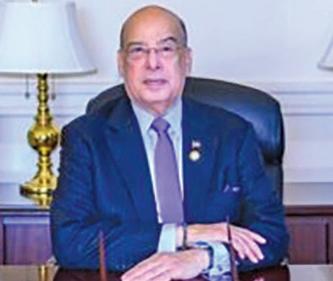
Antigua and Barbuda’s Ambassador to the United States and Permanent Representative to the Organisation of American States (OAS), Sir Ronald Sanders
and aspiration echoing from the sugar estates, the hinterland, and villages across the country. “It is a promise that the nation’s aston-
The family of Latoya Griffith, a 32-yearold mother of three who died at the New Amsterdam Regional Hospital on Thursday, just one day before her baby also passed away, is calling for a full investigation, alleging negligence and claiming that the medical system failed both mother and baby. Speaking at their Gibraltar Village, Region Six, home on Sunday, Griffith’s mother, Virginia Jones, spoke through tears as she recounted the chain of events that led to the double tragedy. Jones said her daughter attended her scheduled clinic on Tuesday and was later admitted to the maternity ward the same day. According to her, Griffith returned home briefly to collect clothing and personal items before being taken back to the hospital. By Thursday morning, the family said Griffith complained that her “water bag” had burst.
“She come, she tell me, ‘Mommy, I feel like my water bag break.’ I said alright. Then she call back and say the nurse run to doctor, and the nurse say it’s a 50-50 case, she have to go to theatre,” Jones recalled. Jones said she was unaware that those would be the final moments she would see her daughter alive. “Soon as I left, things get worse with my daughter. We get a message she need blood. When we reach there, they say she have to go to town. It was so much confusion… mix up, mix up,” she said. According to Jones, relatives were later told repeatedly that it was a “50-

50 situation,” but within hours they were informed that Griffith had died.
“When my daughter and my brother went, they say she pass. We sit down there waiting to see her… they push you out, cover her up so we can’t see she,” the grieving mother recounted. She said when she was finally allowed to view her daughter’s remains, she was horrified. Adding to their unimaginable grief, her baby died the next day, and family members believe that the newborn’s distress was ignored. Jones said the baby did not appear to be breathing at birth and believes the newborn was already in distress as Griffith’s condition deteriorated.
“To my opinion, is when me daughter dead, then they take over the baby, because the baby wasn’t breathing anymore,” she claimed. The grieving grandmother claims that there was minimal communication from doctors about what transpired during the delivery, whether labour was induced, or why a C-section became neces-
sary.
“She had no medical issues,” she added.
“No pressure, no sugar, nothing wrong with her… She was going clinic steady, they know all about her.”
She said Griffith had gone through her pregnancy without any complications and was preparing to welcome the new addition to her family.
One of the more serious allegations raised by the family is that Griffith’s signature may have been forged on a medical document.
The family said they are unable to confirm what document was allegedly signed or what it authorised. “We need justice” — three children now left behind,” the grieving mother added. Jones said the loss has shattered her family, particularly Griffith’s three young children, who are now left without their mother. “It ain’t easy… she got her three kids we gotta take care of,” she said. “Me daughter always say, ‘Mommy, I will stay in my house and take care of you and get your money.’ Now look what happen.”
Fighting back tears, Jones said she refuses to let her daughter’s death go unanswered.
“I need justice for my daughter… She done dead and gone... We can’t let this rest,” she said. The family is calling on the Ministry of Health and the regional health authorities to launch a full investigation into the circumstances surrounding both deaths.
To date, the hospital has not issued a public statement on the incident.
ishing bounty—from its fertile soil to its emerging oil and gas wealth—must not become a fortune for the few but a foundation for the many,” he said. “Nations fracture when abundance excludes; they rise when prosperity is shared.” Turning to Guyana’s border controversy with Venezuela, Sir Ronald delivered one of the most forceful defences of Guyana's territorial integ-
rity heard in a UG convocation address. He noted that the Essequibo region—long recognised under the 1899 Arbitral Award—remains subject to Venezuela’s revived and unfounded claims.
But Guyana, he stressed, has responded with “character,” adhering consistently to the UN Charter and the rule of international law.
“Guyana’s strength lies not in the power of arms, but in the power of law—and in its fidelity to that law even when provoked,” he said, highlighting that this principled stance has earned the respect of the international community.
Against this backdrop, Sir Ronald cautioned against the belief that a change of Government in Caracas would automatically resolve the dispute. Territorial ambitions, he argued, “survive the host in which they first found life” unless decisively settled through international adjudication. He called for Guyana to continue expanding alliances within CARICOM, the Americas, and globally—alliances that “make aggression costly and principle powerful.”
Guyana, he said, must
continue urging Venezuela to respect the International Court of Justice (ICJ) process and commit, as Guyana already has, to accepting its final ruling. “For peace without law is a truce; peace with law is a settlement and a closure,” he declared.
A charge to the graduating class Returning to the heart of the convocation—the students—Sir Ronald described their graduation as taking place at “a moment of extraordinary opportunity.” With Guyana expected to grow by more than 15 per cent this year and the non-oil sector expanding almost as rapidly, he told graduands they stand at the threshold of a national transformation unseen in previous generations. “You will inherit a Guyana of unprecedented possibilities,” he said. But with opportunity comes responsibility: to guard against division, uphold justice, and ensure that the nation’s wealth becomes the people’s wealth. “The future of Guyana will not be written merely in budgets or in barrels,” he reminded them, “but in the character, courage, and clarity of purpose of its young citizens.”
ExxonMobil rejects claims that oil discoveries were hidden, says all required disclosures were made
ExxonMobil Guyana Limited (EMGL) has rejected suggestions raised in a recent media report that the company or the Government concealed new oil discoveries in the Stabroek Block. In a statement issued on Sunday, the company described the claims as “inaccurate and misleading,” insisting that all discoveries were properly reported to the authorities in keeping with Guyana’s regulatory requirements.
The company explained that it is legally required to submit a Notice of Discovery to the Ministry of Natural Resources for every hydrocarbon find, regardless of size or commercial value, and said it has fully complied with this obligation.
According to EMGL, the three wells referenced in the Ministry of Finance’s 2025 Mid-Year Report were disclosed to the Government through this formal process. EMGL noted that this is why the wells appeared in the Mid-Year Report, even though they had not been announced publicly. The company further clarified that it publicly announces only discoveries deemed “significant”, that is, discoveries that materially affect development planning or resource estimates. The wells mentioned in the Mid-Year Report did not meet that threshold,

EMGL said, adding that it has publicly announced more than 30 major discoveries to date, while filing 51 Notices of Discovery with the Ministry. “This reflects our commitment to transparency and regulatory compliance,” the statement said.
EMGL also reiterated that it remains committed to operating responsibly and transparently in alignment with Guyana’s contractual and regulatory framework.
The company’s clarification follows public discussion prompted by a recently published article that highlighted the inclusion of three new Stabroek Block discoveries in the Government’s Mid-Year Report. The article questioned why no public announcements had been made for the year and raised broader concerns about transparency in the management of Guyana’s oil resources. It pointed to the report’s statement that “three discoveries were made in the Stabroek Block in 2025,” including two during the first half of the year, and noted that exploration and appraisal activities remain ongoing.
The media report also referenced commentary from public officials and industry observers who have, in the past, questioned the pace and consistency of updates to Guyana’s estimated oil reserves. Over the years, there have been periodic discussions, both within policy circles and among civil society stakeholdersregarding how reserve estimates are calculated, who verifies them, and how they relate to long-term planning issues such as decommissioning costs. Some of these concerns resurfaced in the wake of the Mid-Year Report’s publication.
ExxonMobil, for its part, maintains that its reserve estimates and disclosures follow established industry practice and that differences between the company’s figures and the Government’s occasionally occur because the State conducts independent assessments using the data supplied by the operator. EMGL has previously stated that its current estimate remains “a little under 11 billion oil equivalent barrels,” while the Government’s latest figure stands at 11.6 billion.

After its initial outreach and recruitment phase, which was described as a success, the Department of Education- Reg#10 was heartened by the “strong start” of its Community-Based Adult & School Leavers Literacy Programme.
According to the department, the team first visited the communities of Three Friends, Old England, and Coomacka, where flyers were distributed and residents were engaged on the benefits of the programme. The response from community members was encouraging, and several persons had expressed interest in enrolling.
As the programme officially began on November 11, participants experienced an orientation session where they were provided with an overview of the programme and introduced to the purpose, goals, and importance of the initiative.
After “ice-breaking” activities that included a “Build the Tallest Tower in 3 Minutes!”, the group was given practical demonstrations showing why learning to read is essential in everyday life, and real-life examples of how improved literacy can create positive change at home, work, and in the community. In addition, parents received guidance on how to support their children with reading and learning at home. One-on-one literacy assessments were done on Tuesday, and numeracy assessments were completed on Thursday. These assessments, the department noted, are crucial for identifying each participant’s current skill level and ensuring that instruction is targeted, supportive, and responsive to their individual needs. The first session was described as productive, interactive, and filled with positive energy; setting the tone for meaningful learning and

growth as the programme continues. “This positive reception affirms the strong desire within our communities to strengthen literacy and numeracy skills for personal and professional growth,” it noted in a Facebook post. “We look forward to the weeks ahead as we continue to empower our adults and school leavers with the skills they need to thrive.” The programme is currently in its implementation phase, with sessions being held every Tuesday and Thursday at the Coomacka Primary School, beginning at 16:00h.
Former Education Minister, Priya Manickchand, had noted back in 2021 that while Guyanese students continue to do well in English at the national examinations, there still remains an issue with illiteracy among the population. She had announced then that the Ministry would re-establish the adult literacy pro -
gramme in communities and implement workplace literacy programmes. Additionally, the Ministry aimed to expand community-based literacy programmes in various communities in all education districts for out-of-school youths and dropouts, who have low literacy rates. Working adults whose limited literacy skills hinder their ability to perform job functions effectively and advance professionally; and adolescents and young adults who are no longer enrolled in formal education and require alternative literacy pathways to support personal development and employability, are targeted in the initiative.
According to reports, illiteracy and the high primary school dropout rate are national issues in Guyana, with over 50 per cent of the country’s working-age population having a primary school education or less. Adult Literacy
Narcotics continue to be intercepted across the country as Police intensify operations targeting the movement and storage of illegal drugs. In the latest incident, an intelligence-led operation at Number 77 Housing Scheme, Corentyne, on Sunday, uncovered more than 1.5 kilograms (kg) of cannabis and led to the arrest of a 31-year-old female cook from the area. The discovery adds to a series of drug seizures recorded over the past several days across Regions Six (East Berbice-Corentyne), Seven (Cuyuni Mazaruni), and Eight (Potaro-Siparuni), signaling heightened vigilance by law enforcement. Sunday’s operation unfolded
around 10:00h, when ranks from Regional Division Six launched a targeted search in an abandoned house lot located just south of the woman’s home. Inside the lot, officers found a grey jumbo garbage bag containing two transparent plastic-wrapped parcels and a white paint bucket, each holding leaves, seeds, and stems suspected to be cannabis.
The woman was immediately taken into custody and escorted to the Springlands Police Station, where the suspected narcotics were weighed in her presence. The total amounted to 1.585 kg before the items were processed and lodged as the investigation continues.
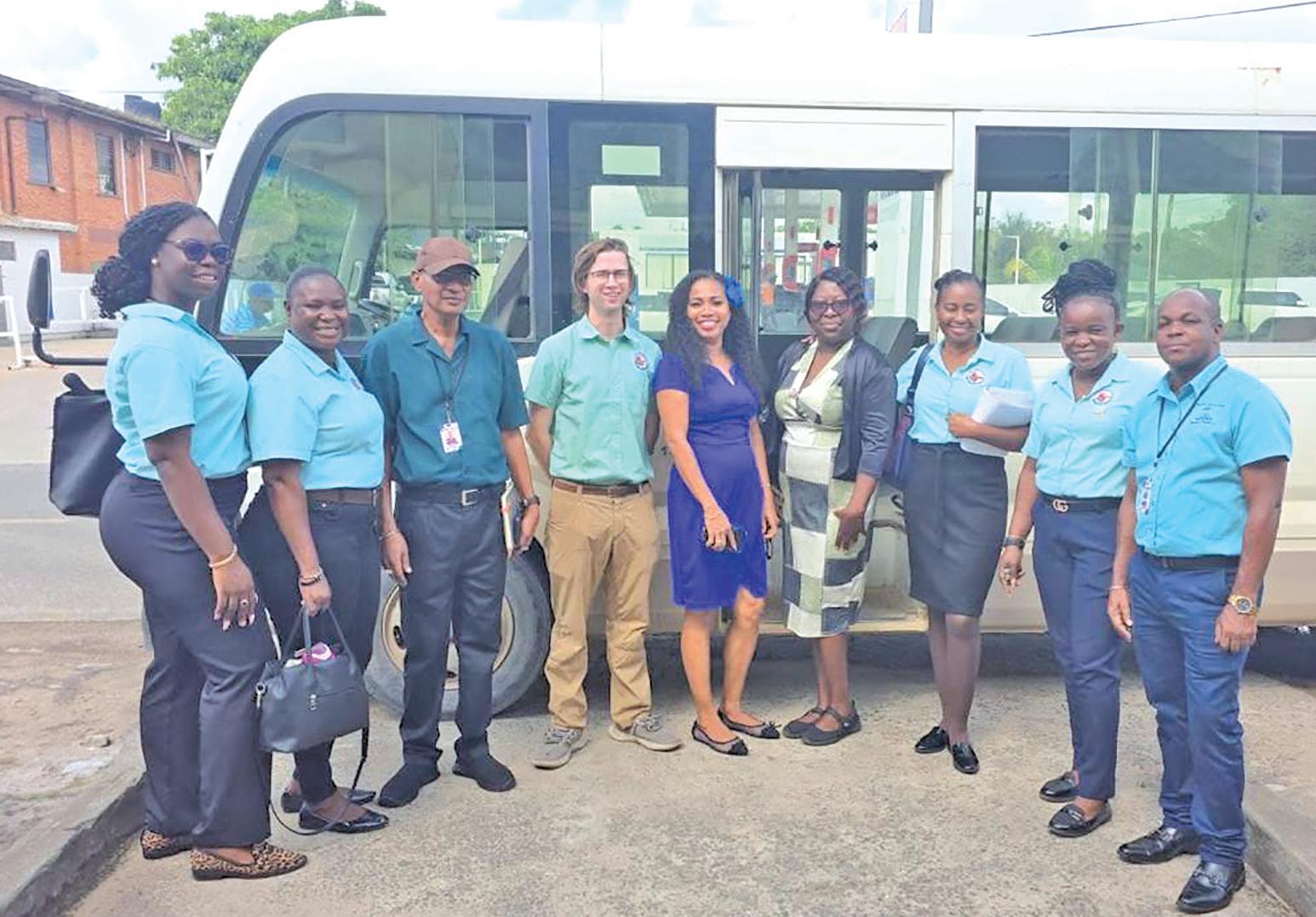
Programmes aim to improve reading, writing, and problem-solving skills necessary for individuals to function effectively in society. They recognise the diverse needs of adult learners, often integrating
real-life scenarios and empirical learning that align with their daily responsibilities and experiences.
Alabourer of Henrietta, Essequibo Coast, Region Two (PomeroonSupenaam) was in the wee hours of Saturday taken into custody following the discovery of a quantity of cannabis during a police operation.
Police stated that during a patrol, ranks observed a silver Toyota Allion motorcar bearing registration number, PNN 1705 with two male occupants proceeding in a western direction, during which the passenger sitting in the front seat was seen acting in a suspicious manner.
As a result, ranks instructed the driver to stop and both occupants exited the vehicle.
A search was conducted on the driver and the motorcar but nothing of evidential value was found.
A further search was conducted on the passenger, a 26-year-old Labourer of Henrietta, Essequibo Coast during which ranks found a transparent plastic bag containing 16 Ziplock packets with cannabis in the left back pocket of his trousers.

The suspect and the suspected cannabis were escorted to the Anna Regina Police Station where the cannabis was weighed and amounted to 35.8 grams. He remains in custody pending charges.
Police in Division 6 have launched an investigation after a Taurus pistol and a magazine containing nine live rounds of ammunition were found inside the male washroom of a New Amsterdam hotel.
According to information received, the illegal firearm and ammunition were discovered on Sunday at about 02:00h in the male washroom on the lower flat of the Leisure Inn Hotel and Bar, New Amsterdam, Berbice.
Initial investigations indicate that a 24-year-old male security guard attached to the hotel discovered the gun and ammunition and

immediately notified his supervisor, who contacted the police. Ranks visited the location, where the firearm and ammunition were handed over. No arrests have been made as investigations continue.




By Dr Tariq Jagnarine Fam meD, enDocrinology/ DiaBeTes
Chronic Kidney Disease
(CKD) is steadily becoming one of the most serious yet least-understood health challenges facing families across Guyana. It is a quiet illness, often unnoticed until the kidneys are significantly damaged, earning it a reputation as one of the world’s most silent but deadly conditions. As more Guyanese are diagnosed with diabetes, hypertension, and lifestyle-related disorders, kidney disease has moved from the margins of public-health discussions to the centre of community concern.
What CKD really is Kidneys are often described as the body’s natural filters, but their role goes far beyond that simple comparison. Every day, they clear waste products from the blood, regulate blood pressure, balance electrolytes, help produce red blood cells, and support bone health.
Chronic Kidney Disease occurs when these vital organs gradually lose their ability to perform these functions. This deterioration happens slowly and quietly, sometimes over many years, making early detection difficult without
regular checkups.
The facts behind the threat
Globally, over 850 million people are living with kidney disease, and CKD has climbed into the top 10 causes of death worldwide. In the Caribbean, and particularly in Guyana, the rise of kidney disease has been closely linked to increasing rates of diabetes and hypertension. Dialysis centres across the country have seen a growing demand, with many patients
most productive years, placing emotional, financial, and social strain on entire families.
Why CKD is becoming more common
The leading causes of CKD are not mysterious; they are part of the everyday health concerns in Guyana. Poorly-controlled diabetes remains the number one cause, as high blood sugar over many years gradually scars and weakens the kidneys’ tiny filtering units. Hypertension

only learning about their kidney damage when it has already reached an advanced stage. What makes CKD especially heartbreaking is that it often affects individuals during their
follows closely behind; constant pressure in the blood vessels slowly wears down the delicate kidney tissue. Repeated kidney infections, untreated urinary tract infections, long-term
As Guyanese are preparing to redecorate their homes with new furniture this Christmas season, the Guyana National Bureau of Standards (GNBS) urged consumers to place quality at the forefront of their purchasing decisions during this peak period. From its website, gnbsgy.org, the agency noted that it monitors furniture under the mandatory national standard GYS 9-5:2003 – Specification for Labelling of Commodities, Part 5: Labelling of Furniture to ensure high-quality products are available on the local market. This standard, which was updated in 2003, addresses long-standing consumer concerns about the quality of furniture locally. It seeks to prevent low-quality wood products from being marketed as high-grade materials, while providing manufac-
turers and importers with clear guidance on proper industry practices and standards. Its enforcement by the GNBS helps maintain consumer confidence in furniture sold nationwide. The standard specifies that each label should clearly indicate the item type, the manufacturer or supplier, the materials used and care instructions, allowing consumers to make well-informed purchasing decisions. Consumers are also encouraged to ensure that these labels remain attached until the point of purchase, as a properly labelled item allows buyers to make better choices.
The standard seeks to prevent the misrepresentation of inferior wood products as premium varieties. Consumers should also check labels to verify whether furniture is made of solid wood or particle board. In addition, informed purchasing deci-

use of strong painkillers, and inherited kidney disorders also contribute to the rising number of cases.
Lifestyle changes have played a major role. Highsalt diets, sugary beverages, sedentary habits, and late diagnosis of chronic diseases have all created the perfect environment for CKD to flourish.
Why CKD should matter to everyone CKD is not a disease that stays hidden in hospitals; it affects households, workplaces, and entire communities. When a breadwinner must attend dialysis three times per week, or when a parent becomes too tired to work or take care of children, the ripple effects are far-reaching. Early-stage CKD can be completely manageable, but late detection often leads to sudden lifestyle disruption. This makes awareness the most powerful tool we have.
Signs and symptoms
One of the challenges with CKD is that symptoms are vague and easily mistaken for everyday stress or ageing. Many patients recall months of swelling in the ankles, persistent tiredness, foamy urine, or frequent bathroom visits at night, but dismissed them as “nothing serious”. Other symptoms can include loss of appetite, nausea, itching skin, muscle cramps, or difficulty concentrating. By the time these symptoms appear clearly, the kidneys may have already suffered significant damage.
Fortunately, diagnosing CKD is simple and painless. A basic blood test that checks creatinine levels and calculates the kidney’s filtration rate
“Know what you’re buying” – GNBS urges consumers to shop quality furniture this holiday

sions help consumers avoid spending money on weak or poorly constructed items while contributing to higher-quality offerings on the local market. Concurrently, adherence to GNBS labelling standards motivates local manufacturers to produce stronger, safer, and more durable furniture. Further, furniture sellers are required to obtain a permit from the GNBS. Application forms are available on the forms tab on its website, Head Office and Sub-Offices. During the holiday season, the GNBS intensifies its inspections


(eGFR) gives a clear picture of how well the kidneys are functioning. A urine test can detect protein leakage, one of the earliest signs of kidney damage. Ultrasound imaging can assess kidney size and structure, and blood pressure measurements help determine whether hypertension is contributing to the damage. For individuals with diabetes, high blood pressure, or a family history of kidney problems, these tests should be done annually.
Treatment
There is no cure for CKD, but its progression can be slowed dramatically when detected early. Treatment focuses on managing the underlying causes: keeping blood sugar well-controlled in people with diabetes and ensuring healthy blood-pressure levels in hypertensive patients. Doctors may prescribe medications that help protect the kidneys, reduce inflammation, and correct imbalances in minerals like potassium and phosphorus. Dietary changes also play a crucial role, reducing salt, limiting processed foods, moderating protein intake, avoiding sugary beverages, and choosing fresh fruits and vegetables.
For some people, especially in late-stage CKD, dialysis becomes necessary to remove waste and excess fluid when the kidneys can no longer do so. Others may be candidates for a kidney transplant, which can offer a long-term return to normal life.
Untreated CKD can lead to severe complications, including heart failure, stroke, severe anaemia, fluid build-up in the lungs, nerve damage, dangerous electrolyte imbalances, and eventually complete kidney failure. Because the kidneys influence so many bodily functions, when they fail, multiple systems begin to struggle. This is why CKD is so often linked to premature death.
Prognosis
The outlook for individuals with CKD varies widely. Those diagnosed early often lead full, productive lives with the help of medication, routine monitoring, and lifestyle adjustments. Those who are diagnosed late may face more aggressive treatments, including lifelong dialysis. However, even in advanced stages, quality of life can improve significantly with proper care, emotional support, and access to medical services.
Prevention
Preventing CKD begins with simple daily habits: drinking enough water, limiting salt, reducing sugary drinks, eating more fruits and vegetables, exercising regularly, and avoiding unnecessary painkillers. Most importantly, people living with diabetes or hypertension must prioritise their checkups, take medication as prescribed, and maintain regular testing. Prevention is far easier than treatment, and it starts long before symptoms appear.
Do:
• Drink water throughout the day
• Keep blood pressure and blood sugar under control.
• Eat balanced meals and reduce salt.
• Get yearly kidney tests if you are at risk.
• Exercise regularly
• Treat infections early
Don’t:
• Ignore swelling, foamy urine, or unusual tiredness.
at ports of entry, warehouses, and retail stores to protect consumers from substandard or mislabelled goods. Furniture also falls under the Bureau’s Product Compliance Programme, which monitors 17 categories of products; therefore, non-compliant furniture may be seized or required to be relabelled.
For further information, please contact the GNBS on telephone numbers 219-0065, 219-0066, or via WhatsApp at 6924627 (GNBS) or visit our Standards Portal at gnbsguy.com.
• Take painkillers frequently or without medical advice
• Overuse herbal mixtures of unknown ingredients
• Eat large amounts of salty snacks, canned foods, or fast foods
• Delay treatment for diabetes or hypertension
Chronic Kidney Disease may be silent, but its impact on families is loud and life-changing. The good news is that early detection and simple lifestyle choices can prevent or delay most cases. This is not just a medical issue; it is a community responsibility. Every Guyanese deserves the chance to protect their kidneys and live a long, healthy life. Awareness, early testing, and healthier choices can help make that future a reality.
The Trinidad and Tobago Government is distancing itself from the United States’ decision to revoke the visa of Gary Aboud, corporate secretary of the NGO Fishermen and Friends of the Sea (FFOS).
Aboud confirmed he was informed by the U.S. Embassy in Port of Spain that his B1/ B2 visa had been “prudentially revoked.”
“This email is considered official notification of that revocation,” the Embassy email stated, explaining that the action was “based on the fact” that new information suggested Aboud may be “inadmissible” to the United States.
Aboud, who has recently criticised the increased U.S. naval presence near Venezuela, said FFOS has spent 28 years advocating for equity, justice, sustainable development, and protection for vulnerable coastal communities. He argued that the visa action reflects a broader attempt to muzzle civil society.
“Today, however, we face
an alarming reality: NGOs are being silenced,” he said, adding that independent civil organisations are essential for transparency and oversight. FFOS also stated it supports the prime minister in a lawful fight against drug and arms trafficking but “will never condone unlawful killings.”
Prime Minister Kamla Persad-Bissessar swiftly rejected Aboud’s claims and any suggestion that her administration had a role in the U.S. action. In a statement on X, she said visa and immigration decisions fall “solely within the jurisdiction” of the United States and must be addressed with U.S. authorities. She also pushed back against Aboud’s allegation that NGOs are being targeted. “Contrary to Mr Aboud’s assertions, non-governmental organisations are not being silenced. Such an inflammatory allegation is reckless, misleading and risks causing unnecessary fear,” she said. PersadBissessar stressed her gov-
ernment’s commitment to freedom of speech, noting that even political opponents are free to speak without interference.
The prime minister argued that the real threats facing Trinidad and Tobago are criminal networks driving guns, drugs, and human trafficking across the region. Persad-Bissessar, who has previously said those involved in the illegal drug trade should be killed “violently,” reiterated her stance: “I stand by my position that these dangerous criminals must be confronted decisively.” She added that her government supports U.S. and international partners in combating transnational crime.
Persad-Bissessar also credited the increased U.S. military presence in the Caribbean with reducing illicit flows into Trinidad and Tobago, saying the deployment — including U.S. Marines and other military assets — has produced “evident” results. (Source: Caribbean National Weekly)
The World Bank, in coordination with the Inter-American Development Bank (IDB), estimates that the physical damage to Jamaica caused by Hurricane Melissa totals US$8.8 billion — equivalent to 41 per cent of the country’s 2024 GDP — making it the costliest hurricane in Jamaica’s recorded history.
The Global Rapid Damage Estimation (GRADE), conducted immediately after the hurricane, assessed physical damage across residential, non-residential, infrastructure, and agricultural sectors. It does not include broader economic losses, which are expected to be even more significant.
The GRADE assessment will inform a more detailed evaluation of damages and economic losses by sectors as part of a collaboration with the Inter-American Development Bank and the United Nations Economic
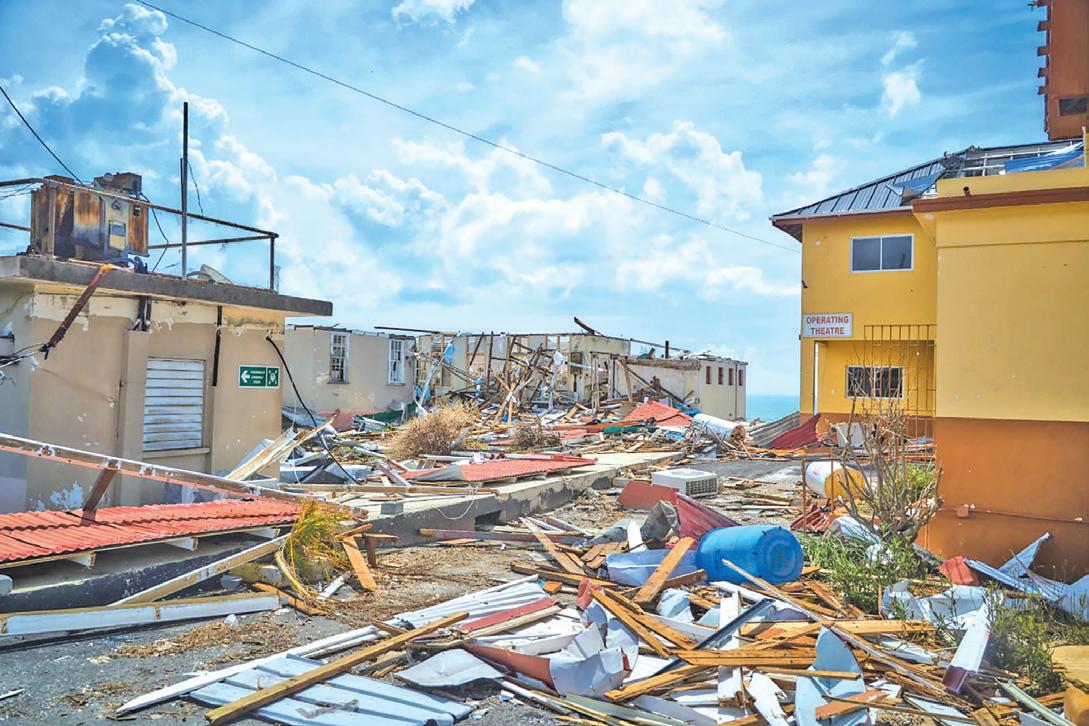
Commission for Latin America and the Caribbean (ECLAC), and, under the leadership of the Planning Institute of Jamaica.
According to the preliminary findings, 41 per cent of the assessed damages were to residential buildings, 33 per cent to infrastructure, 21 per cent to non-residential buildings, and five per cent to the agriculture sector, including livestock
and related infrastructure. While physical damage to agriculture is comparatively lower, the sector is expected to face significant economic losses.
The GRADE methodology provides an independent, rapid estimation of physical post-disaster damage, offering an initial sector-by-sector quantification of a disaster’s severity. (Excerpt from St Lucia Times)
A22 year-old police constable, attached to the Specialized Operations Branch, is one of four men arrested early Sunday morning on suspicion of robbery and praedial larceny in Clarendon, Jamaica.
The constable was arrested on the Morgan Pass main road on suspicion of possessing a prohibited
weapon, robbery, and praedial larceny.
Three other suspects— two of them teenagers, all from the same community— were also arrested.
The police say, around 3:40 a.m., officers intercepted a grey Toyota Probox with four men on board. There were three goats in the vehicle, according to the police. A search of the vehi-
cle reportedly turned up a Glock 19 pistol with twelve rounds, two cellphones, a laptop, and a one-strap bag.
In a dramatic twist, investigators say the constable was later taken to his home for a search, when he allegedly leapt through a window in an attempt to escape but was quickly recaptured. (Source: Radio Jamaica)

Former Brazilian President Jair Bolsonaro said on Sunday he experienced a medicine-induced "paranoia" that led him to violate his electronic ankle monitor, a document seen by Reuters showed, one day after the federal police took him into custody as a potential flight risk.
On Saturday, Supreme Court Justice Alexandre de Moraes ordered the detention of the former right-wing leader ahead of a planned supporters' vigil outside his home, which the judge said could undermine police monitoring of his house arrest. He also noted a police report that Bolsonaro's ankle monitor was violated.
In a custody hearing following his detention, Bolsonaro denied any intent to escape house arrest or attempt to remove the equipment, the document showed, as he said he had a "hallucination" that there was a wire inside the monitor.

Bolsonaro told the judge that the mix of medicines prescribed by different doctors led to the episode. He said he began taking one of them only four days before his detention on Saturday morning.
The former president said he was alone during the episode, as everyone present in the house – his daughter, his older brother and an adviser – was asleep at the time.
"The witness stated that, around midnight, he tampered with the ankle bracelet, then 'came to his senses' and stopped using the soldering iron, at which point he informed the officers in charge of his custody," the document showed.
The judge overseeing the hearing decided to maintain police custody as all legal rules were followed during the former president's arrest.
A separate document
showed on Saturday that officials received an alert about a possible breach of Bolsonaro's ankle monitor, while police officers at his residence found the device with "clear and significant damage" and burn marks. Bolsonaro is currently detained in a small holding cell in a federal police site, with a single bed, a television, air conditioning and a bathroom. He is expected to receive a visit from his wife, the former first lady Michelle Bolsonaro, later on Sunday, after seeing a doctor and one of his lawyers in the morning. She was not in Brasilia when the arrest happened. (Excerpt from Reuters)
Suriname-French Guiana border law proceedings have been suspended after a petition was sent to the Suriname parliament by Okanisi granman Bono Velantie. The Okanisi, are one of six Maroon peoples in the Republic of Suriname.
According to reports, the Suriname National Assembly (DNA) meeting has been adjourned until a date to be determined. The parliamentary
Committee of Rapporteurs had held an official meeting November 14 with Granman Bono Velantie, regarding the draft law that would ratify the new border arrangement between Suriname and France.
Chief Captain John Lesina, who serves on Granman Velantie's Cabinet, welcomed the decision to suspend consideration of the bill concerning the border issue between
Suriname and French Guiana.
According to the chief captain, communities in the border region have lived there for over three hundred years. "Therefore, it cannot be the case that a law is suddenly passed that imposes restrictions on our people," he emphasized. He called it crucial that all aspects are carefully considered, both land and water borders. (Source: Suriname Herald)
Three international airlines canceled their flights departing from Venezuela on Saturday, the day after the U.S. Federal Aviation Administration warned major airlines of a "potentially hazardous situation" when flying over the country.
Brazil's Gol, Colombia's Avianca and TAP Air Portugal canceled their flights departing from Caracas on Saturday, according to Flightradar24 and the official website of Simon Bolivar Maiquetia International Airport.
Aeronautica Civil de Colombia said in a statement there were "poten-
tial risks" of flying in the Maiquetia area "due to the deterioration of security conditions and increased military activity in the region."
TAP Air Portugal confirmed it canceled its flights scheduled for Saturday and next Tuesday. "This decision follows information issued by the United States aviation authorities, which indicates that safety conditions in Venezuelan airspace are not guaranteed," the company told Reuters.
Copa Airlines and Wingo kept their flights departing from Maiquetia on Saturday.
The U.S. FAA notice cited the "worsening security situation and heightened military activity in or around Venezuela" and said threats could pose risks for aircraft at all altitudes. There has been a massive American military buildup in the region in recent months, including the U.S. Navy's largest aircraft carrier, at least eight other warships, and F-35 aircraft. (Excerpt from Reuters)
Spain's Iberia also said it was canceling their flights to Caracas from Monday until further notice. The Spanish company's flight scheduled on Saturday to Madrid from Venezuela's capital departed.

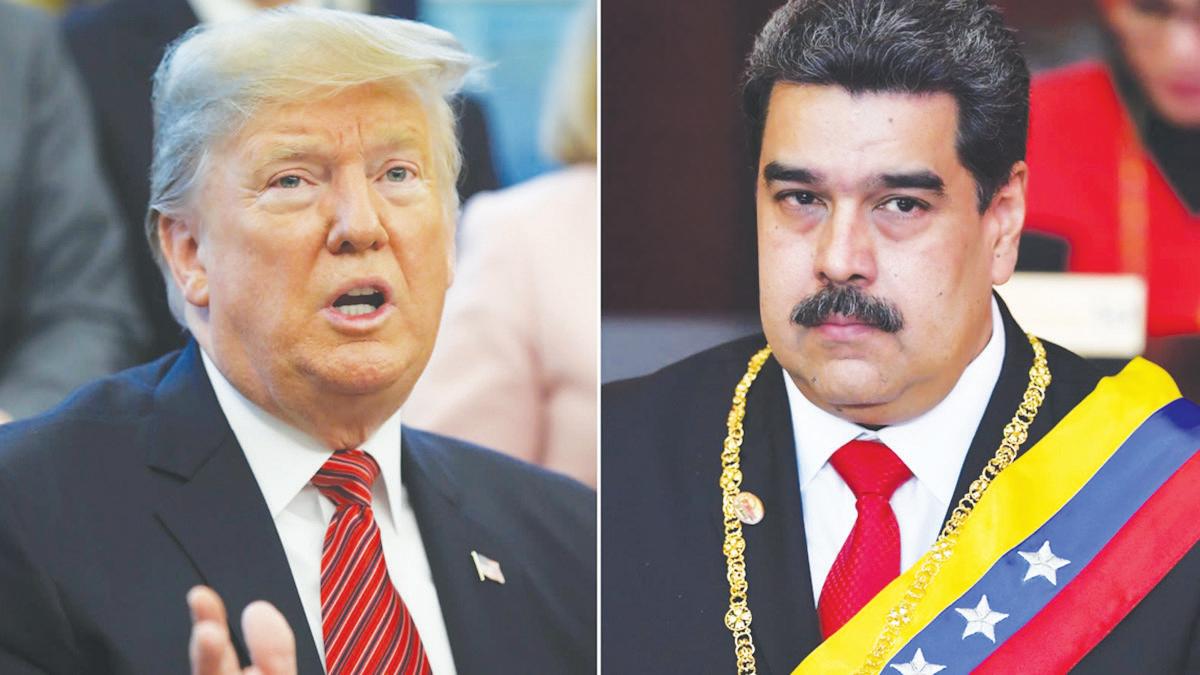
The United States is poised to launch a new phase of Venezuelarelated operations in the coming days, four US officials told Reuters, as the Trump administration escalates pressure on President Nicolas Maduro's government.
Reuters was not able to establish the exact timing or scope of the new operations, nor whether US President Donald Trump had made a final decision to act. Reports of looming action have proliferated in recent weeks as the US military has deployed forces to the Caribbean amid worsening relations with Venezuela.
Two of the U.S. officials said covert operations would likely be the first part of the new action against Maduro. All four officials quoted in this article spoke on the condition of anonymity because of the sensitivity of impending ac-
tion by the United States.
The Pentagon referred questions to the White House. The CIA declined to comment.
A senior administration official on Saturday did not rule anything out regarding Venezuela.
"President Trump is prepared to use every element of American power to stop drugs from flooding into our country and to bring those responsible to justice," said the official, speaking on the condition of anonymity.
The Trump administration has been weighing Venezuela-related options to combat what it has portrayed as Maduro’s role in supplying illegal drugs that have killed Americans. He has denied having any links to the illegal drug trade.
Two U.S. officials told Reuters the options under consideration includ-
ed attempting to overthrow Maduro.
Maduro, in power since 2013, has contended that Trump seeks to oust him and that Venezuelan citizens and the military will resist any such attempt.
The Venezuelan president, who celebrates his 63rd birthday on Sunday, appeared on Saturday night at Caracas' main theater for the premiere of a television series based on his life.
A military buildup in the Caribbean has been underway for months, and Trump has authorized covert CIA operations in Venezuela.
The U.S. Federal Aviation Administration on Friday warned major airlines of a "potentially hazardous situation" when flying over Venezuela and urged them to exercise caution. (Excerpt from Reuters)
South Africa’s president, Cyril Ramaphosa, closed the G20 summit in Johannesburg by banging a gavel, having rejected a US proposal for him to hand over to a relatively junior embassy official for the next summit in Florida in a year’s time.
South Africa presented the two-day event as a triumph for multilateralism but it was marred by a boycott by the US, which has repeatedly accused South Africa of discriminating against white-minority Afrikaners, a claim that has been widely discredited.
Ramaphosa said in his closing speech: “We’ve met in the face of significant challenges and demonstrated our ability to come together, even in times of great difficulty, to pursue a better world.”
Wrapping up his address, he said: “This gavel
of this G20 summit formally closes this summit and now moves on to the next president of the G20, which is the United States, where we shall see each other again next year.”
It was Ramaphosa’s only mention of the country absent from the gathering of the world’s largest economies.
The G20 issued a declaration on Saturday emphasising the need to tackle climate change and achieve “gender equality”. Donald Trump’s administration withdrew from the Paris climate agreement on the first day of his second term in office and has reversed many policies designed to tackle sexism, racism and homophobia.
The White House spokesperson Anna Kelly accused Ramaphosa of “refusing to facilitate a smooth transition of the G20 presidency”.
Two Russian warships were intercepted in the English Channel by the Royal Navy, the Ministry of Defence (MoD) has said.
In the latest incident involving Russia's ships entering waters around the UK, HMS Severn headed off the RFN Stoikiy, a corvette and Yelnya, a tanker, as they sailed west through the Dover Strait into the English Channel in the past fortnight.
Last week, it emerged that the Russian spy ship Yantar was spotted off the coast of Scotland and it used lasers to disrupt RAF pilots tracking its movements.
Defence Secretary John Healey branded the Yantar's move "deeply dangerous" and warned Russia and its president Vladimir Putin: "We see you. We know what you're doing. We are ready."
Healey said last week

that there had been a 30% increase in Russian vessels threatening UK waters in the past two years.
The MoD said after intercepting the Stoikiy and the Yelnya, the HMS Severn later handed over monitoring duties to a Nato ally off the coast of Brittany, north west Fr.
It said the UK ship "continued to observe from a distance and remained ready to respond to any unexpected activity".
Healey has said that the rise in Russian activity in UK waters was evidence of increased "Russian aggression right across the board" which he says is impacting Europe, not just Ukraine. At a news conference in Downing Street last week, the defence secretary said he had changed the Royal Navy's rules of engagement so that it could follow the Yantar more closely "when it is in our wider waters".
(Excerpt from BBC News)
Vladimir Putin could return to the world stage under a European peace plan that agrees to allow Russia back into the G8.
The offer was made in a counter-proposal to Donald Trump’s controversial plan that heavily favoured Russia.
The European plan contains several concessions, including a cap on the size of Ukraine’s army and a commitment to elections that could see Volodymyr Zelensky removed from power – a key demand of Moscow.
Under the European plan, Russia is “to be progressively re-integrated into the global economy”. The plan adds that the country could rejoin the G8.
South Africa’s foreign minister, Ronald Lamola, told reporters: “From us, the ball has moved. We are done. It’s up to them. If they want to come, we are available.”
The 2026 summit is scheduled to take place at the Trump National Doral Miami golf resort, which is owned by the Trump Organization.
Argentina, whose president, Javier Milei, skipped the summit, also refused to endorse the declaration.
Russia’s Vladimir Putin, China’s Xi Jinping and Mexico’s Claudia Sheinbaum were also absent from the summit. Putin is wanted by the international criminal court, to which South Africa is a signatory. Xi has delegated attending many international gatherings this year to China’s premier, Li Qiang. (Excerpt from The Guardian)
The deal also states that the “size of Ukraine military is to be capped at 800,000 in peacetime”, whereas an earlier ver-
sion of the European plan included no cap. The USRussian proposal asked for a 600,000 cap. The deal adds: “Ukraine will hold elections as soon as possible after the signing of the peace agreement.”
However, the European deal removes Russia’s demand that Ukraine gives up the eastern Donbas region.
The deal also removes a clause that would give the US 50 per cent of future profits from frozen Russian assets invested in Ukraine.
The 28-point plan drawn up by the Americans demanded that Ukraine give up large tracts of land, including territory that has not even been conquered by Russian forces.
The European counter-proposal says that “negotiations on territorial swaps will start from the line of contact” or front line.
The Europeans want Russian sovereign assets to remain frozen until Moscow pays compensation for the immense damage it has caused since its fullscale invasion.
The counter-plan was drawn up by Britain, Germany and France –the so-called European E3 powers.
Following an emergency summit in Geneva, Marco Rubio, the US secretary of state, said on Sunday night that the US was now “making some changes” to its peace plan.
The counter-proposals were published after the US president said Ukraine had shown “zero gratitude” for American efforts to end the war.
Mr Trump still has to sign off on the deal, Mr Rubio said. Russia, which has repeatedly changed its demands, also has to sign off on it. (Excerpt from The Telegraph)
At least 50 of the more than 300 students abducted by gunmen from a Catholic school in Nigeria have escaped their captors, a Christian group tracking the incident says.
The gunmen raided Saint Mary’s Catholic School in north-central Nigeria’s Niger State on Friday, taking 303 children and 12 teachers in one of the country’s largest mass kidnappings.
In a statement on Sunday, the Christian Association of Nigeria (CAN) said the 50 pupils
were safe and had been reunited with their families after they escaped between Friday and Saturday.
“As much as we receive the return of these 50 children that escaped with some sigh of relief, I urge you all to continue in your prayers for the rescue and safe return of the remaining victims,” CAN’s chairman in Niger State, Reverend Bulus Dauwa Yohanna, said in the statement.
The Catholic school abduction came just four days after armed men stormed a secondary school in north-
western Nigeria, kidnapping 25 schoolgirls and killing the school’s vice-principal.
Monday’s attack took place in similar circumstances in neighbouring Kebbi State’s Maga town, some 170km (106 miles) away. At least one girl has since escaped and returned safely, but 24 others are still missing.
The identity of the attackers remains unclear in both cases, and no group has claimed responsibility so far. (Excerpt from Al Jazeera)






















Think twice before you react to something. Situations may not be as they appear. Offering support and a positive response will help you navigate your way to the truth and justice.

The sky is the limit when you put your mind to achieving your goals. Partnerships and creative pursuits look promising and enriching. A change will spark your interest.

Listen, absorb and change what's necessary to keep the peace and to ensure you get to finish what you start. How you navigate your way through situations will determine your success.

Interacting will play a crucial role in determining how much you accomplish and how much help you receive. Utilize your charm, knowledge and networking skills to enhance your confidence and foster leadership.

Immerse yourself in events that challenge you in positive ways. Leave no time or room for self-pity. Trust your instincts and act on them.

Speak up and deal with unfinished business. Social or networking events can lead to opportunities and a deeper understanding of who you are and how to achieve your goals.




Keep your head down, your heart protected and your mind on what you want to achieve. Trust your ability to adapt quickly, your intuition to pick up on unsavory interactions and your innate charm to counteract negativity.
Letting your leadership qualities shine will encourage opportunities. Partnerships look promising. Education will lead to increased income.


Make domestic adjustments that offer freedom to pursue exciting avenues. It's OK to be different and to take the road less traveled. Be true to yourself.


Proceed with a passionate and positive attitude, and you will gain momentum, support and a chance to demonstrate your potential. Someone you encounter will interest you personally.



Pay attention to money, expiration dates and keeping your personal documents current. Be good to yourself, live within your means and enjoy life's simple pleasures.

Get in the game, share your thoughts, offer your support and engage in your community. Do all the above with a positive attitude and a smile on your face, and something good will transpire.


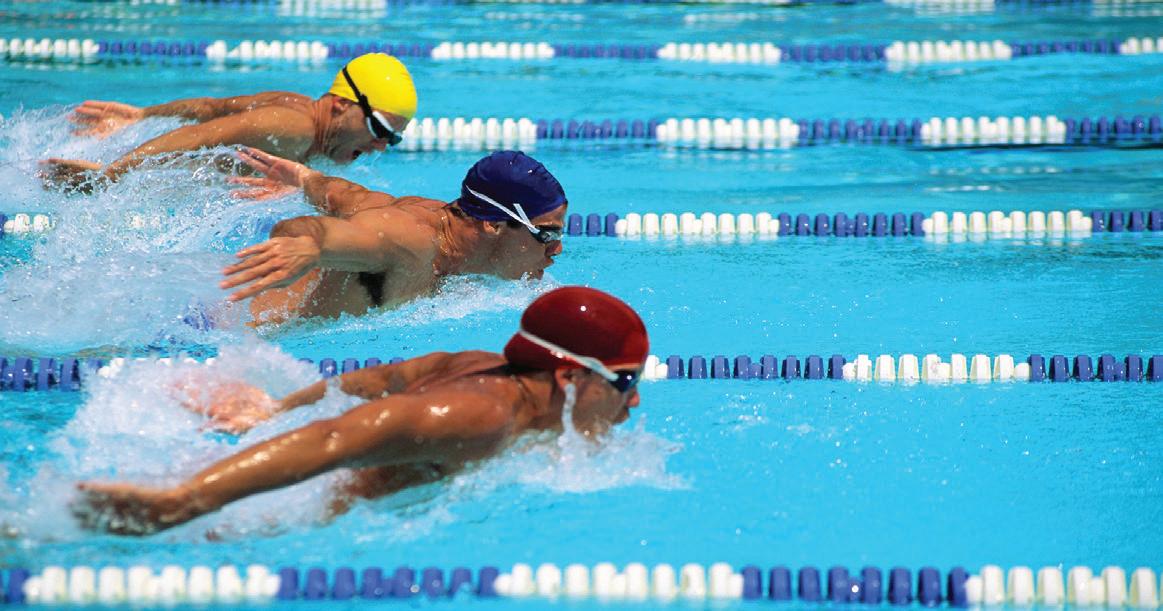



Amaiden hundred for Senuran Muthusamy and a career-best 93 from Marco Jansen went a long way to take South Africa close to batting India out of the Guwahati Test and the two-match series. No team has lost a Test in India after scoring as many as South Africa's 489. If South Africa can keep that record intact, they will have pushed India to a second home-series loss in 12 months after they went 12 years without any. At the start of the second day, 489 looked like a
million miles away. And while Muthusamy and Kyle Verreynne steadied the ship from the overnight 247 for 6, if South Africa had continued at that scoring rate, they would have barely crossed 400 in the 151.1 overs that they batted.
However, Jansen's 93 off 91, including a record seven sixes against India in India, knocked the wind out of India's sails when they would still have been hopeful despite having bowled 120.1 overs for seven wickets. With Jansen, Muthusamy also upped the

intent as the two put together the highest partnership of the series: 97 in 17.4 overs. Muthusamy became the ninth centurion for South Africa this year, but Jansen fell seven short of equalling the world record of 10 different centurions in one year.
Even before Jansen, Muthusamy and Verreynne had done enough to frustrate India. The pitch, which had kept the bowlers interested on day one, was flatter because the early moisture had completely dried off. Even then, South Africa lost wickets on day one only when they tried to force the pace. On day two, now six down, they seemed to have decided to take time out of the game, not necessarily for a draw in mind but to deny India batting when the pitch was still good.
For nearly 40 overs on the second morning, India were not able to build any wicket-taking threat. When they thought they had Muthuswamy lbw on the sweep against Ravindra Jadeja, a faint murmur on UltraEdge reversed the decision. Muthusamy especially looked in complete control, playing only 13 false shots in his 205-ball stay at the wicket. Eventually, it was Verreynne charging at Jadeja too early that allowed India a wicket.
Still, it was only mid-afternoon, and South Africa were only 334 for 7. If India could bowl them out for under 400, they were still in with a good chance to force their way back into the match.
Out came Jansen and hit a no-look six off Jadeja. Then he slog-swept him for a four and a six. India tried Kuldeep Yadav to look to beat him in the air, but he stepped out of the crease and lofted him nonchalantly over long-on. Muthusamy also grew bold and began to

slog-sweep whenever he got a chance.
Muthusamy was 67 off 160 when Verreynne got out, but added 43 off 47 after that. India's frustration grew as they now tried to bounce these batters. Jasprit Bumrah drew a top edge that fell just short of fine leg, resulting in a dirty look from Bumrah to Mohammed Siraj, who was asked to bend his back after Bumrah had done so.
First ball after tea, Siraj induced the top edge to get rid of Muthusamy, but the strategy did not work against Jansen, who lobbed him over mid-on with a pull shot and then hooked him for a six. That the pitch was still good to bat on showed in how Rishabh Pant now asked both his fast bowlers to bowl in tandem. Bumrah hit the top of off of Simon Harmer, but even that did not bring much respite.
Jansen and Keshav Maharaj added 27 for the last wicket. Jansen's reach remained the feature of his innings, messing up the idea of a good length, but he batted with the mindset of a specialist batter even though his strike rate of over 100 might suggest a cavalier approach. Finally, he was dismissed as he followed a Kuldeep wrong'un
and chopped on, disgusted with himself for getting out so close to a hundred.
Kuldeep ended up with four wickets, but this was his first on day two. Jadeja, Bumrah and Siraj got two each. This was only the fourth time since the end of 2016 that India had been kept on the field for 150 overs.
Tired bodies and minds were now looking at a long
South Africa 1st Innings
Aiden Markram b Bumrah 38
Ryan Rickelton c †Pant
b Kuldeep Yadav 35
Tristan Stubbs c Rahul
b Kuldeep Yadav 49
Temba Bavuma (c) c Jaiswal
b Jadeja 41
Tony de Zorzi c †Pant
b Mohammed Siraj 28
Wiaan Mulder c Jaiswal
b Kuldeep Yadav 13
Senuran Muthusamy c Jaiswal
b Mohammed Siraj 109
Kyle Verreynne † st † Pant
b Jadeja 45
Marco Jansen b Kuldeep Yadav 93
Simon Harmer b Bumrah 5
Keshav Maharaj not out 12
Extras (b 8, lb 8, nb 4, w 1) 21
Total 151.1 Ov (RR: 3.23) 489
Fall of wickets: 1-82 (Aiden
Markram, 26.5 ov), 2-82 (Ryan Rickelton, 27.2 ov), 3-166 (Temba Bavuma, 57.2 ov), 4-187 (Tristan Stubbs, 63.1 ov), 5-201 (Wiaan Mulder, 67.2 ov), 6-246 (Tony
and adventurous route to save the series, but first they had to survive the awkward half an hour before stumps in fading light. While they had to face only 4.1 overs before bad light ended the day's play, this trend of having time only for 80 overs or so in India's eastern-most venue only strengthened South Africa's chances of holding onto the series lead. (ESPNcricinfo)

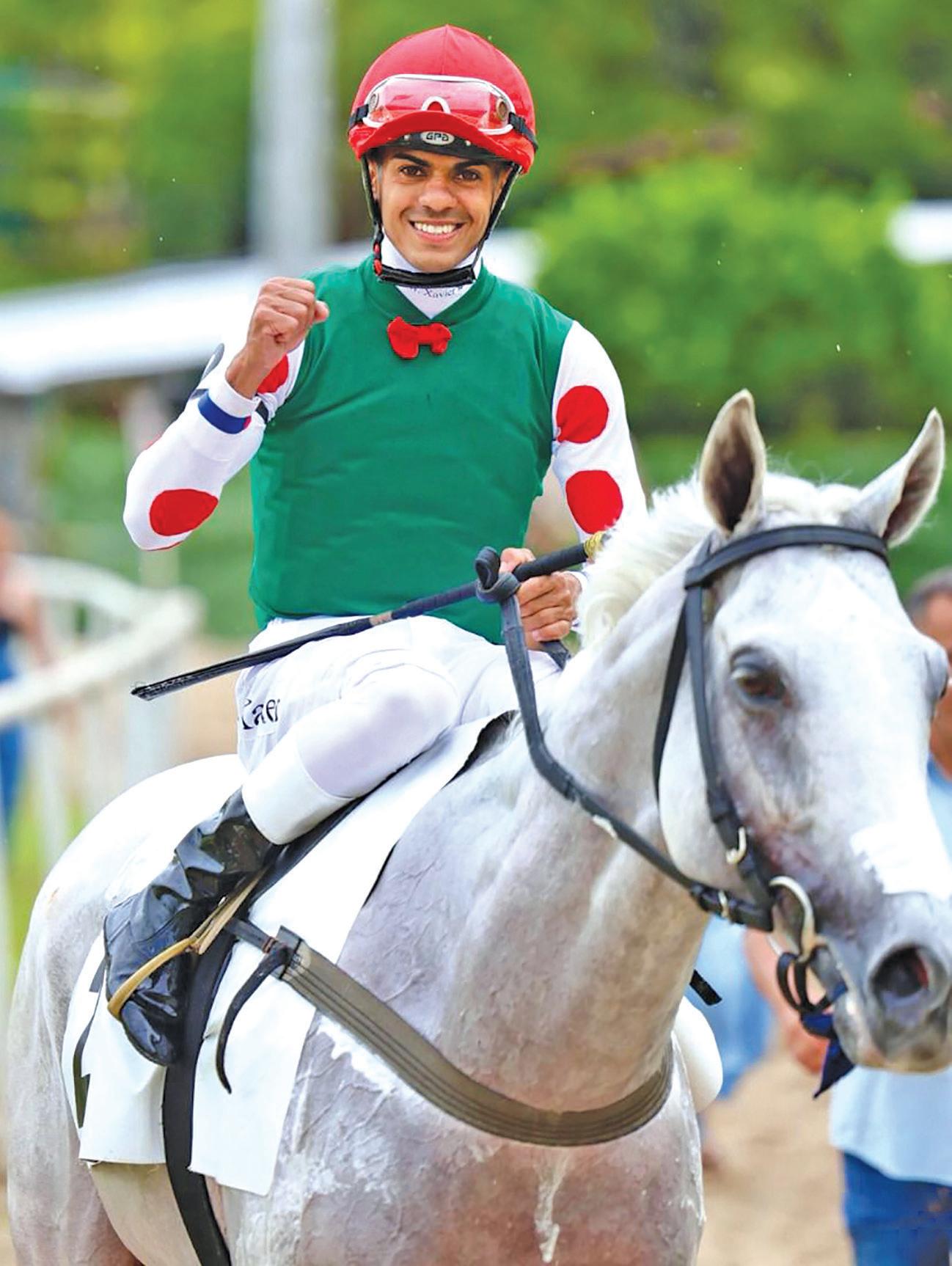

Brazil’s proud tradition of producing world-class racehorses and elite professionals is once again drawing attention, this time from Guyana, where horse racing is entering an exciting new era.
With the sport rapidly developing in Guyana, Brazilian bloodlines and expertise have become a prime target for owners looking to elevate competition at home and abroad.
Guyana has long followed the success of Brazilian racing. Now, Guyanese horse owners are taking concrete steps to strengthen that connection.
Brazilian horses have begun to arrive in increasing numbers, and trainers and other professionals are finding opportunities in a market eager to grow.
At the centre of this developing relationship is trainer Lênio Vieira, who has emerged as the key link between the two countries.
Vieira has been responsible for identifying, preparing, and exporting promising Brazilian horses to Guyana, helping raise the overall quality of racing here.
Among the most active investors is Slingerz Racing, one of Guyana’s leading and most ambitious stables.
Slingerz Racing has shown a strong commitment to Brazilian talent, not only purchasing horses to compete in Guyana’s premier events, but also keeping runners in training at the Hipódromo da Gávea, where it can pursue major victories on Brazilian soil.
That strategy is already paying dividends. Last Monday, Olympic National delivered Slingerz Racing its first major victory in Brazil, winning the Much Better Classic with authority. The breakthrough signalled that Slingerz’s investment in Brazilian horses was well-placed.
Just days later, the momentum continued. Galo White produced a commanding performance to capture the Almirante Tamandaré Grand Prix (G2).
The grey left no doubt about his superiority, securing another high-profile win and further energising his Guyanese owners.
These results have only strengthened Slingerz Racing’s commitment to Brazil and encouraged additional Guyanese investors to explore opportunities in the country.
The interest now goes beyond acquiring horses for export; several owners are considering maintaining permanent strings in Brazil to compete directly on the nation’s top racetracks.
As Brazil and Guyana deepen their collaboration, both nations are beginning to write an important new chapter in South American racing.
Lando Norris and McLaren team-mate
Oscar Piastri have been disqualified from the Las Vegas Grand Prix for technical infringements.
The skid blocks on both cars were found after the race to be less than the minimum depth allowed in the rules.
Norris, who finished second to Red Bull's Max Verstappen, is now 24 points ahead of both the Dutchman and Piastri going into the penultimate race of the season in Qatar next weekend.
The Briton, 26, will still win the drivers' title in Qatar with a round to spare if he earns two more points than both Verstappen and Piastri over the course of the weekend.
There are a maximum of 58 points available in the final two grands prix with Qatar being a sprint event.
After Qatar, the final race follows in Abu Dhabi on December 7.
Verstappen has won the past four drivers' championships, while Norris and Piastri are both seeking their first.
Norris's disqualification lifts Mercedes drivers George Russell and Kimi Antonelli into second and third respectively in Vegas.
Australian Piastri had finished fourth.
Norris said: "It's frustrating to lose so many points. As a team, we're always pushing to find as much performance as we can, and we clearly didn't get that balance right today.
"Nothing I can do will change that now, instead full focus switches to Qatar, where we'll aim to go out and deliver the best possible performance in every session."
Huge boost for Verstappen's title hopes Had the result stood as the cars finished the race, Norris would have had a
30-point lead over Piastri and 42 over Verstappen.
At the start, Norris was true to his claim that he was "not here not to take risks" as he fought hard to defend his advantage from pole position from Verstappen.
But after an aggressive cut in front of Verstappen to head off the Dutchman's attack on the inside, Norris misjudged his braking point and ran deep into the corner.
That allowed Verstappen to drive past into the lead while Norris also lost second place to Russell.
Through two virtual safety cars for some early incidents, including at the start when Racing Bulls' Liam Lawson collided with Piastri, Verstappen slowly stamped his authority on the race.
Russell made an early pit stop for the hard tyres, but Norris and Verstappen stayed out.
Norris stopped five laps
after the Mercedes and Verstappen 10.
Verstappen was able to rejoin still in the lead, Russell having been unable to close in on the Red Bull despite his fresher tyres.
Norris rejoined behind Russell from his stop, but after a few cautious laps to allow his tyres to settle, soon closed his 3.3-second deficit to the Mercedes and swept by into second place on lap 34.


Norris asked his engineer how to run the rest of his race, effectively asking whether he should settle for second or attack.
He was told to "go and get Max" but it soon became clear he had no chance. Verstappen was easily able to repel Norris's attacks, and in the closing stages the margin extended significantly as the McLaren began to suffer what at the time the team described as "a technical issue".

Norris was told to back off, an attempt to reduce the wear on the skid blocks by 'lifting and coasting' at the end of the straights.
This is where a driver backs off the throttle earlier than if he was pushing flatout, coasting for a while and then braking.
It is a common technique for saving fuel. In this case, lifting early reduces top speed, which reduces downforce, so the car does not run as low for as long.
Despite losing nearly three seconds a lap, Norris was able to hold off Russell because of the size of the advantage he had built while chasing Verstappen.
The Red Bull driver's sixth win of the season only one behind both of the McLaren drivers was taken in emphatic style and keeps him in title contention, even if he requires Norris to have more problems overtake him.
"It's still a big gap. We always try and maximise everything we've got,"
Verstappen said after his win, but before the news of the disqualifications came through.
"In upcoming weekends we will try and win the race and at the end of Abu Dhabi we will see where we end up, but I'm very proud of everyone." (BBC Sport)

Waramuri Primary, Marian Academy and Santa Rosa Primary finished the group stage unbeaten in the MVP Sports Girls Under-11 PeeWee tournament, gaining automatic spots in the tournament’s quarter-finals.
West Ruimveldt started the day with a 2-0 victory over Smith Memorial Primary in the second round. Patricia Arthur (11th) and Amy Murray (14th) found the back of the net for the winners.
Then, Marian Academy got past Agatash Primary by the same margin. Haley DeNobrega (8th) and Ella Fernandes (38th) were the goalscorers.
Georgetown International Academy (GIA) later edged Tucville Primary 2-1. Naomi Risse (5th) and Makayla Tuma (38th) scored
for GIA. Jakhaya Blackman (30th) was responsible for Tucville’s consolation.
A double off the boots of Catalena Solomon in the 10th and 28th minutes gifted North Georgetown Primary a 2-0 win against Sophia Primary.
Waramuri Primary closed that round with a 10-0 nailing of St Aloysius Primary. Alina Lewis was the star of the show, registering goals in the 1st, 4th, 20th, 24th and 27th minutes. Alita Marks had a hattrick in the 12th, 14th and 28th minutes while Abrena Thomas secured a brace in the 7th and 31st.
When Round Three kicked off, Santa Rosa Primary mauled Potaro Primary 7-0. Rovena Johnson was the striker to watch, finding the back of the net in the 15th, 18th, 30th and 36th minutes
Dwhile solitary goals came off the boots of Bre Atkinson (2nd); Atika Francis (10th) and Naomi Henry (39th).
An entertaining draw be tween St John the Baptist and West Ruimveldt Primary Schools saw goals off the boots of Akeelah DaSilva (30th) and Patricia Arthur (25th).

Tucville Primary suffered another close loss, this time at the hands of Agatash Primary by a similar 2-1 margin. Agatash’s Delinea Tracey (8th) and Ravenna John (39th) pierced the net while Jasmine Abel (28th) fashioned Tucville’s lone response.
St Aloysius were buoyed by their first win, defeating Sophia Primary 2-0. Rishea McCurdy (5th) and Saniah Pollard (29th) got past the goalkeeper in that contest.
Ella Fernandes (6th,

efending champi on YMCA A will have to defend their crown against the formidable Silver Bullets in the final showdown of the ExxonMobil Guyana Futsal following respective semifinal wins on Saturday evening at the Retrieve Tarmac in Linden.

8th, 21st, 27th, 26th, 28th) showed her skill with six unanswered goals in Marian Academy’s 8-0 drubbing of GIA. Avery Simon (12th) and Haley DeNobrega (17th) also added their names to the scoresheet.
Waramuri Primary closed the day’s proceedings with a goal fest, downing
North Georgetown Primary 11-0.
Alita Marks was the star of that show, finding the back of the net in the 2nd, 4th, 7th, 10th, 13th, 15th and 17th minutes while her teammate Alina Lewis registered a helmet trick in the 19th, 21st, 25th and 27th minutes.
The teams are competing for a
National champions Slingerz Football Club have taken another decisive step towards elevating their brand and strengthening their professional footprint, announcing a strategic partnership with Edge Sports Management, the consultancy founded and led by Guyanese Olympian Chelsea Edghill.
The move reinforces Slingerz FC’s commitment to modernising its operations, increasing player visibility, and positioning itself as a premier football brand within Guyana and the wider region.
He highlighted that Slingerz FC were deliberately strengthening their digital footprint and professional image ahead of the upcoming Guyana Football Federation (GFF) YearEnd tournament, where visibility and fan engagement play a crucial role.
“Edge Sports Management will bring structure to the club’s presence on social media,” Toney explained, adding “we are taking a deliberate approach in bringing more visibility to our players and to our brand as a whole.

Edge Sports Management’s proven performance in its first year of existence aligns seamlessly with Slingerz FC’s short- and long-term strategic goals.
This partnership is a major part of that effort.”
In the first semifinal fixture, YMCA defeated DC Ballers 9-6. Kevin Gittens and Jamal Bentick recorded respective hat-tricks, while Jonah Simon, Keyshawn Dey, and Jermaine Padmore scored one goal each. For the loser, Andre Mayers recorded a double, while Jayshawn Moore, Nicholas Gentle, Adrian Aaron, and Antwoine Gill netted one goal each.
On the other hand, Silver Bullets riddled Hard-knocks 6-1 in the second semifinal.
Sigmund Cobena, Damion Williams, and Colwyn Drakes each recorded a brace in the rout. For the loser, Neron Barrow netted once. The winners will contest the final at the same venue on the 29th. The losers will battle in the third-place playoff.

For Edghill, who launched Edge Sports Management just last year, the partnership also marks a meaningful expansion of her company’s rapidly-growing portfolio.
Edge Sports Management focuses on providing a range of services, including sports consulting, athlete management, event development, and digital branding support.
Despite its newness, the
Toney added that the collaboration was not merely about aesthetics or branding, but about building deeper connections with the club’s community as they prepare for one of the most important competitions on the local calendar.
“Edge Sports Management will bring the players closer to fans and sponsors, starting from the Year-End tournament. That level of connection is vital in modern football. It helps
Edghill, a two-time Olympian in the sport of table tennis, who has since emerged as a strong advocate for athlete professionalism, expressed gratitude for the opportunity to work with the club.
“I want to thank Slingerz FC for trusting Edge Sports Management with one of its most prized assets – its players,” Edghill said. According to the national athlete, “aligning with Slingerz FC and working with some of Guyana’s best talents on an almost daily basis shows how much the club values its players and its brand.”
On the individual level, the eventual Most Valuable
The winner of the event will pocket $1,500,000, while the eventual second, third, and fourth place finishers will receive $750,000, $350,000, and $200,000, respectively, and the corresponding accolade.
Player will ride away with a motorcycle. It was also disclosed that a $300,000 economic grant will be awarded to a player or fan to aid their academic development. Each team must put forward a candidate for the aforesaid scholarship.
Complete Results

company has already established a reputation for producing polished, impactful work, an attribute that made it an ideal fit for the ambitions of Slingerz FC.
Club Vice President Rawle Toney, who oversees marketing, communication, and sponsorship, described the partnership as both strategic and timely.
fans feel involved, and it helps sponsors understand the value of aligning with Slingerz FC,” Toney said.
In today’s sporting landscape, brand visibility is essential, not only for commercial growth but also for player development, recruitment, and long-term sustainability.
According to Toney,
She added that the partnership reflected the professionalism and ambition Slingerz FC have become known for, both on and off the field.
The partnership with Edge Sports Management now complements Slingerz FC’s existing relationship with AdNation.
Slingerz FC and AdNation Guyana share a sponsorship agreement in which AdNation, a custom sign and visual solutions company, supports the club by enhancing its brand visibility through strategic advertising and branding initiatives.



